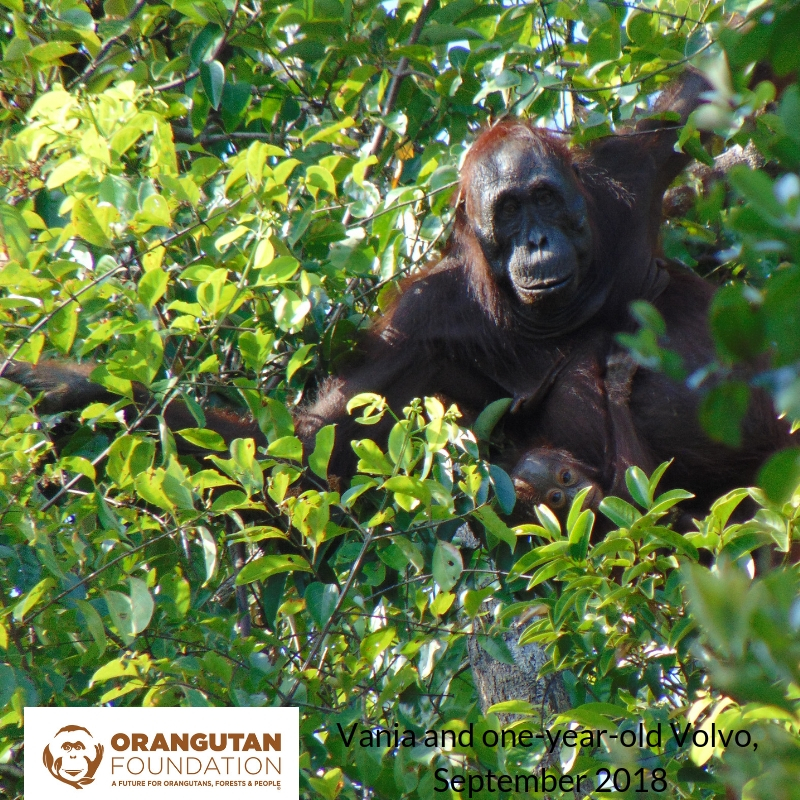Orangutans, biodiversity, forest, research, and fundraising. A look back at the critical conservation success we have had together in 2024.
Hope for orangutans and their forest home
The Indonesian government has announced a presidential instruction, which ordered ministers and regional administrations to ban issuing permits for new plantations for the next three years. We welcome this much needed action. Orangutans can survive, if given a second chance.
Three years ago, in September 2015, we rescued an adult orangutan and her 6-year-old from an oil-palm plantation, which they had entered to escape raging forest fires. Our rescue team managed to capture both orangutans. They named the mother Vania and her offspring Venty. They were released into the protected Lamandau Wildlife Reserve, Central Kalimantan, Indonesian Borneo.
In 2017, Vania was spotted with a newborn, who we named Volvo. Venty, now aged 8-years-old, was still around too.
This month, field staff at Camp Buluh, in the wildlife reserve, saw Venty (image below) by herself in a tree. They then saw Vania with her very healthy looking one-year-old Volvo.
These orangutans live in a protected area, which is guarded and patrolled by Orangutan Foundation. However, 80% of wild orangutans live outside protected areas. This 3-year ban on plantation expansion is the life-line this critically endangered species need.
Please DONATE to support our work.
Thank you.
Celebrating new life whilst battling to save orangutan habitat
This week, our Monday motivation was this incredible footage of orangutan Max with her infant Monti, sent by our staff who are as excited about this new addition as we are. However, the next day, we heard from our Patrol Manager, Jakir, that fires were once again raging close to the Lamandau Wildlife Reserve, Indonesian Borneo. One moment we are celebrating new life, the next we are battling to save the habitat.
Thankfully the wildlife reserve is 158,000 acres in size and the fires are well away from the orangutan release camps. Our 8 manned guard posts, around the reserve, means our patrol staff can respond quickly to keep the reserve safe and prevent the fires from spreading.
Habitat protection is our priority. Please donate to our appeal to help us keep forests standing and orangutans in the wild.
Rescued and released orangutans of Lamandau Wildlife Reserve
Our vet, Dimas and programme manager, Iman, have been on their weekly visits to the orangutan release camps in the Lamandau Wildlife Reserve, Central Kalimantan, Indonesian Borneo. They check on the orphaned young orangutans and ensure the good health of the released orangutans. Their journey took longer than usual because the river levels are very low, due to lack of rain. Instead of travelling by speedboat it was completed in a shallow longboat (or klotok, as they’re called in Indonesia). Our youngest orangutans are cared for at Camp JL and include Timtom, Nyunyu, Adib, Mona (photo below) and Boy. Dimas gave them their multivitamin injection to keep them healthy but they are all well and active.
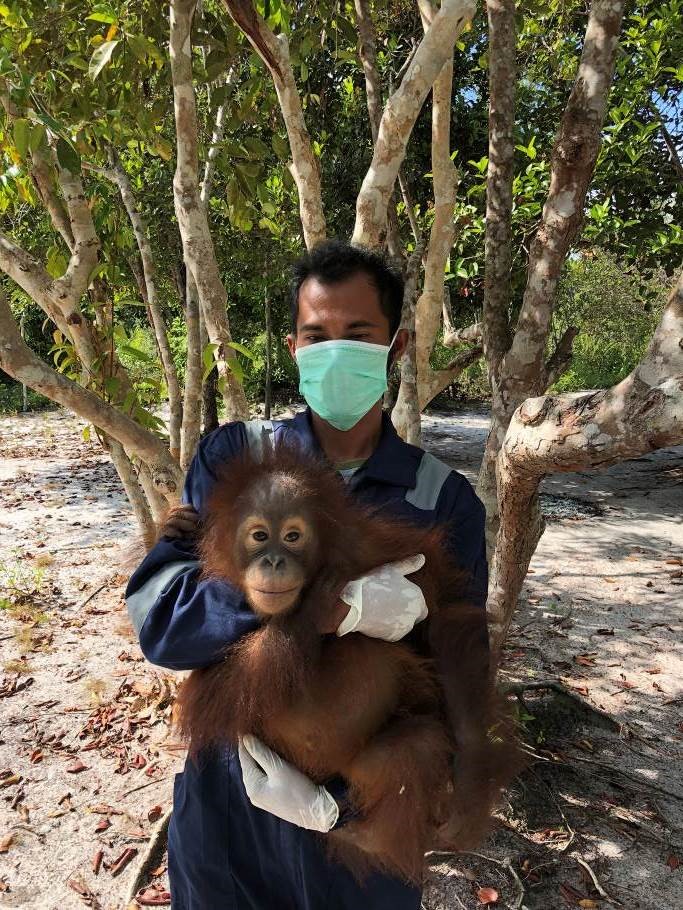
In the afternoon they continued by longboat to Gemini Camp. This is where blind orangutan Aan lives. Aan was shot and can never be returned to the wild. Her enclosure recently had new ropes (see below).
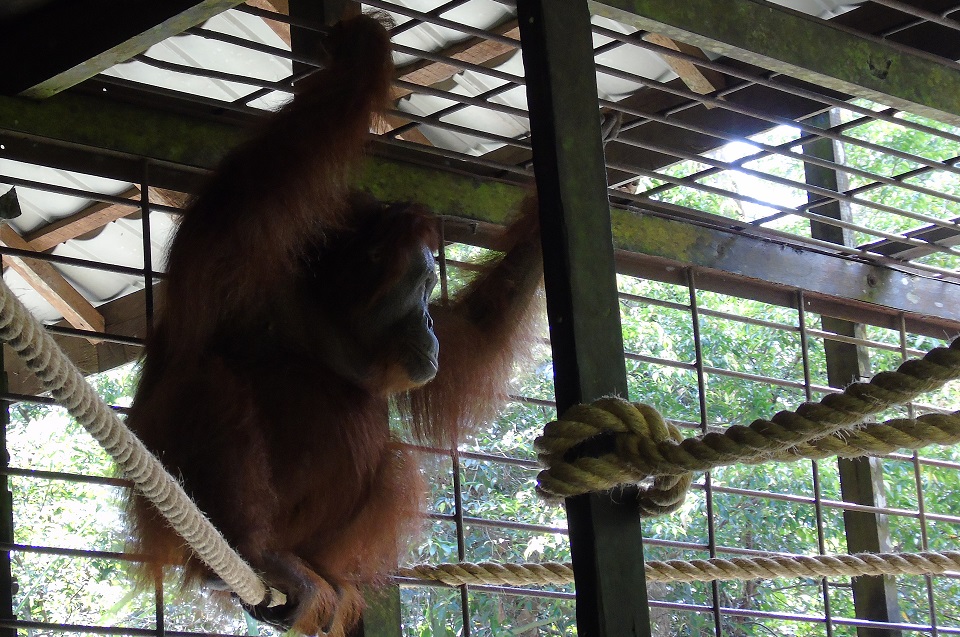
They walked from camp through the forest to the feeding site, where supplementary fruit is provided. Dominant male, Bangkal came to feeding along with female and infant orangutans; Ilik and Izzy; Hola and Happy; Ebony and Ekon (photos below); and Passion and Paris. Max was also seen with her newborn infant, now named Monti and they seemed well.
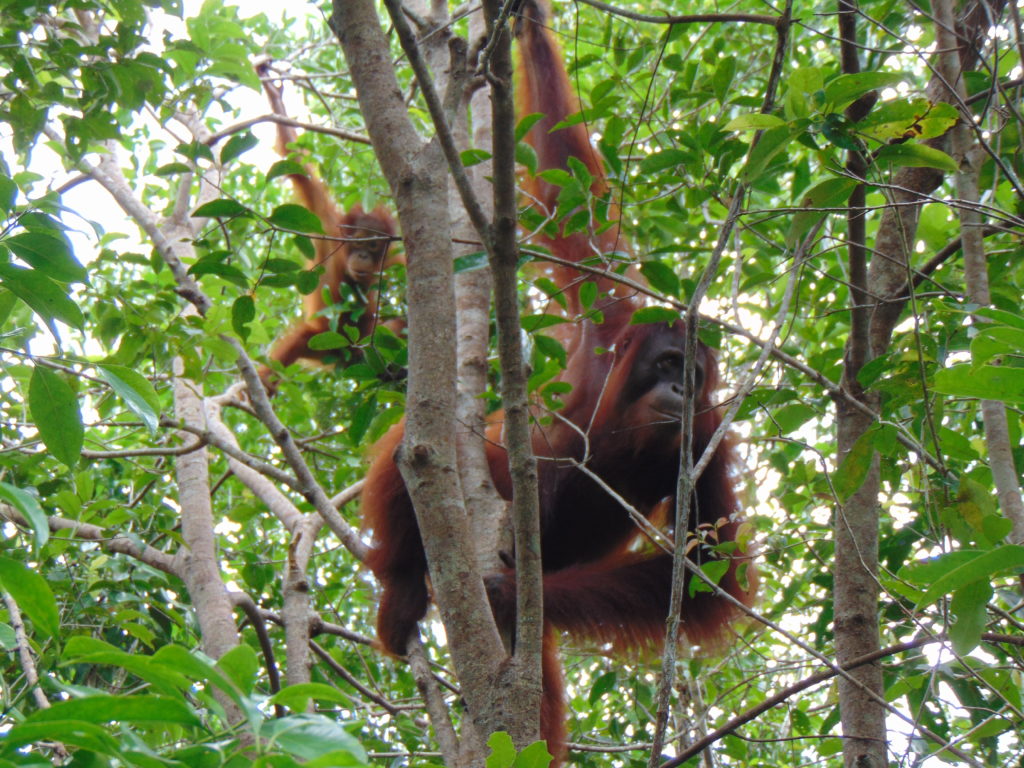
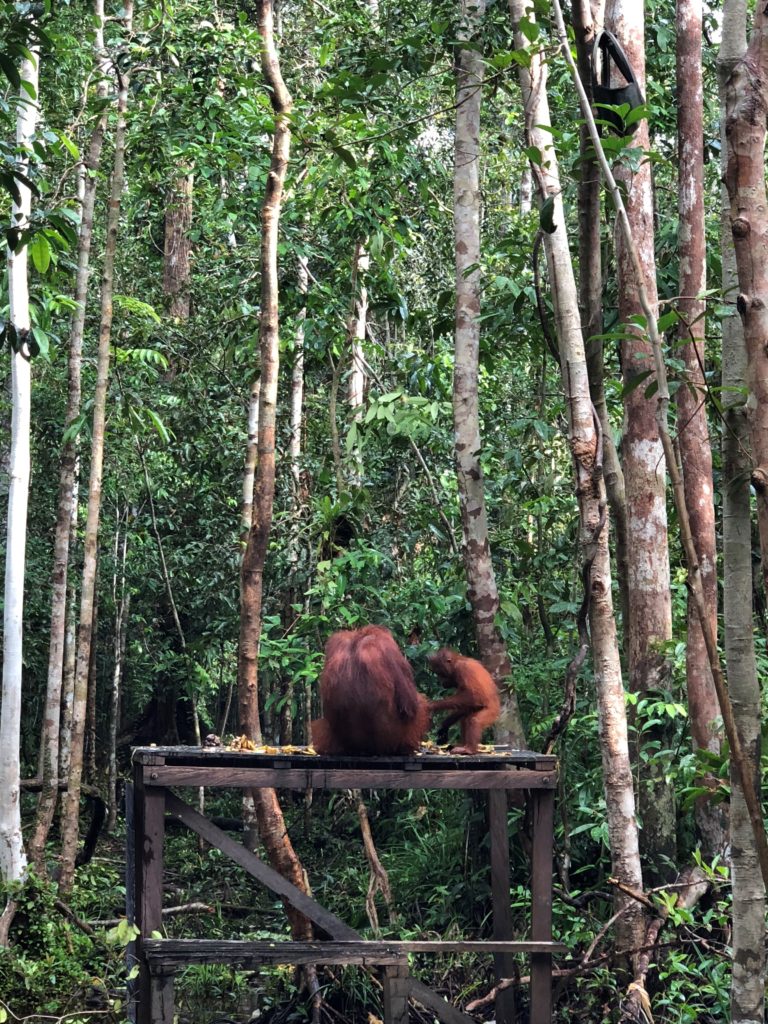
A few days later they went to Camp Buluh, to check on orphan orangutans Okto and Syifa. Okto had injured one of his fingers a few weeks ago but after receiving treatment the inflammation has reduced and is healing well.

Both Okto and Syifa very active and enjoy playing together. Okto was given a final anti-inflammatory injection and both orangutans received their multivitamins.
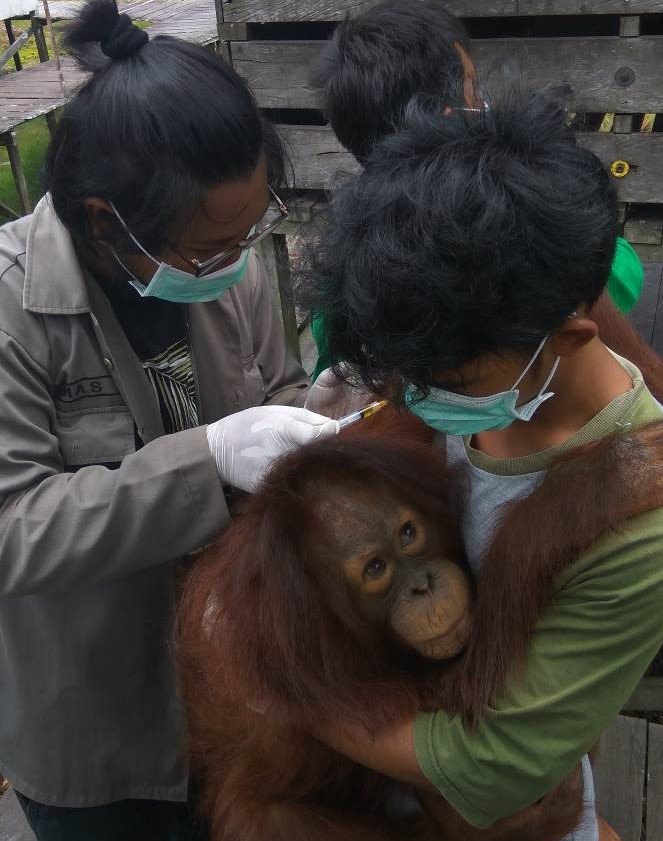
Conditions are very dry at present and so our guard post staff are vigilant and on alert for fires. All the guard posts are equipment with fire-fighting gear and our staff are trained enabling them to respond quickly and effectively to extinguish fires.
Please help us to keep forests standing and orangutans in the wild. You can support our work by donating or adopting Okto or Mona.
Wild orangutan rescued and moved to safety
When our staff arrived at the oil-palm plantation they found the orangutan in an area of forest, on the riverbank of the plantation. We had been called in to help by BKSDA SKW II Pangkalan Bun (government agency for wildlife) who had received reports from an oil-palm plantation of an orangutan in their plantation. It was decided to capture the orangutan and move her to the protected Lamandau Wildlife Reserve, to avoid potential conflict.
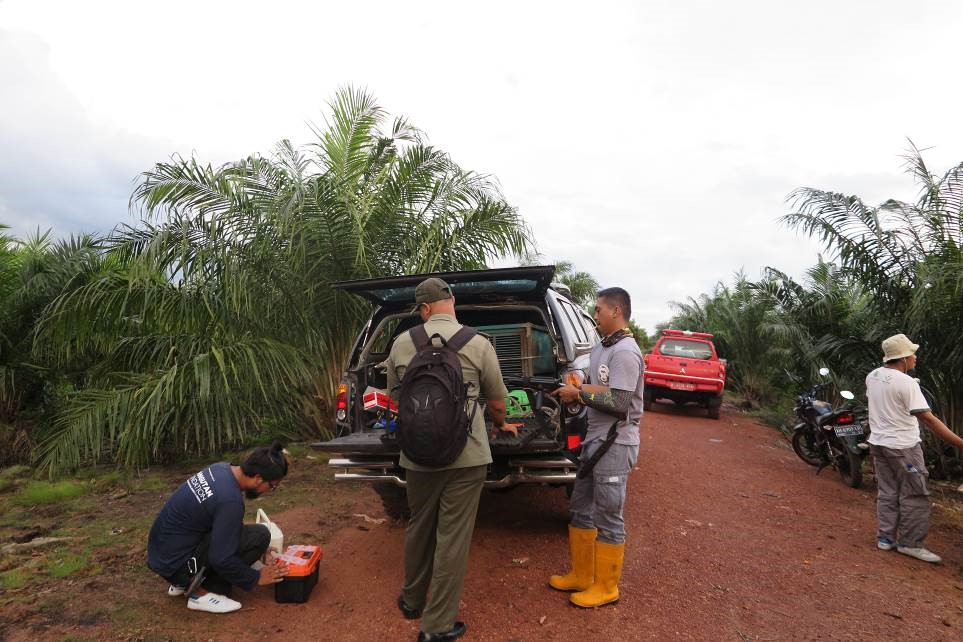
The orangutan, who they identified as female, had made and was resting in a nest. This made it easier to dart her as she wasn’t moving.
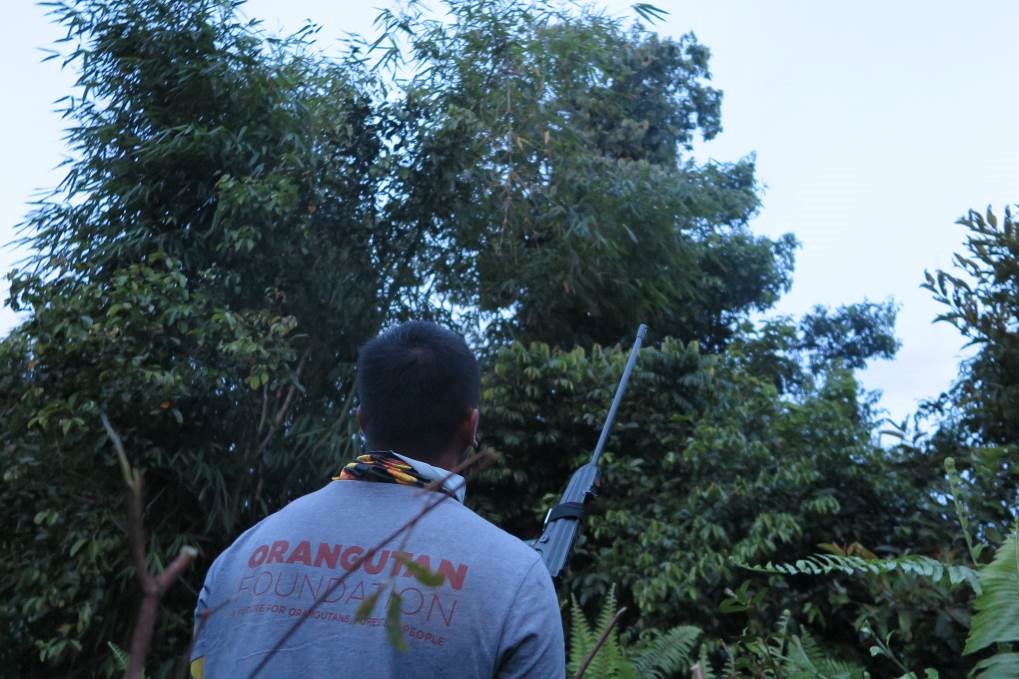
What our staff hadn’t anticipated was that she might just remain where she was and fall asleep, making it very difficult to then rescue her. This is just what happened!
One of our rescue team staff, Mr Nasibah, also an expert tree climber, shinnied up the tree to the nest. With huge effort he managed to lower the unconscious orangutan out of her nest. Our staff on the ground, used netting to catch her, as she fell to the ground.
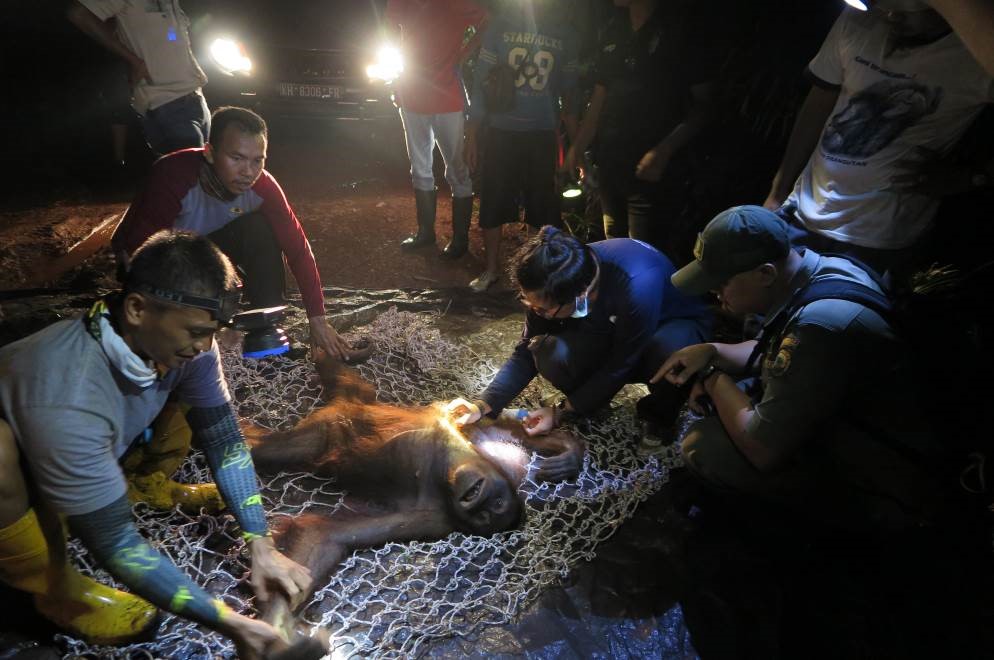
She was quickly transported to an open area where our vet Dr Dimas, examined her. Apart from a small scratch to her chest, she was in full health, weighing 45 kilos and was thought to be around 18 years-old. The scratch was cleaned and injected with long-acting antibiotics to prevent infection.
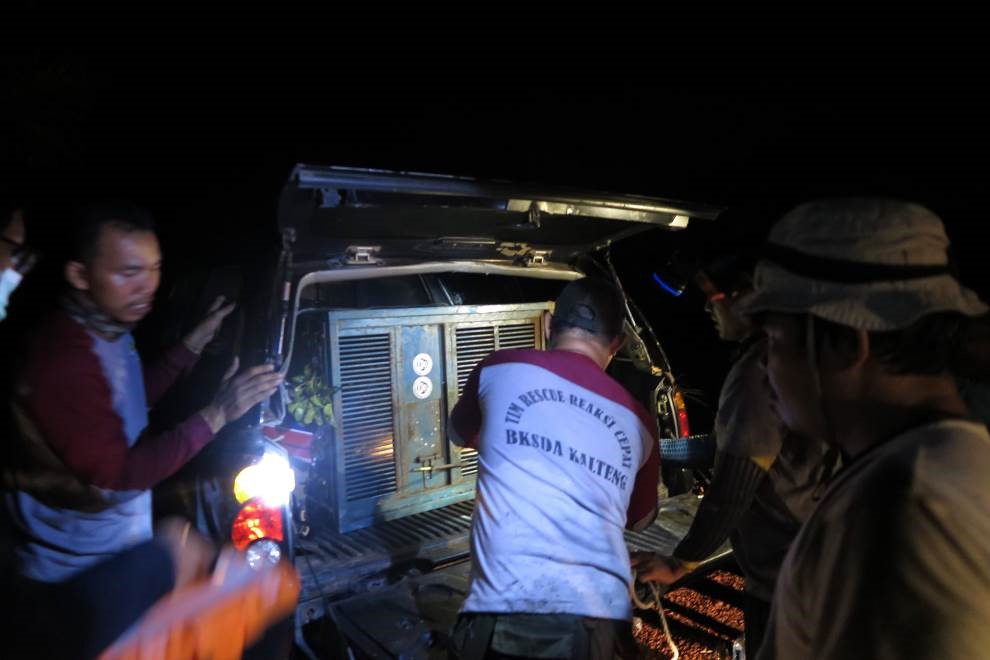
Two days later the orangutan was released in the Lamandau Widlife Reserve, on the opposite side of the river from Camp JL. We protect this forest reserve with guard posts and regular forest patrols to prevent and deter illegal activities.

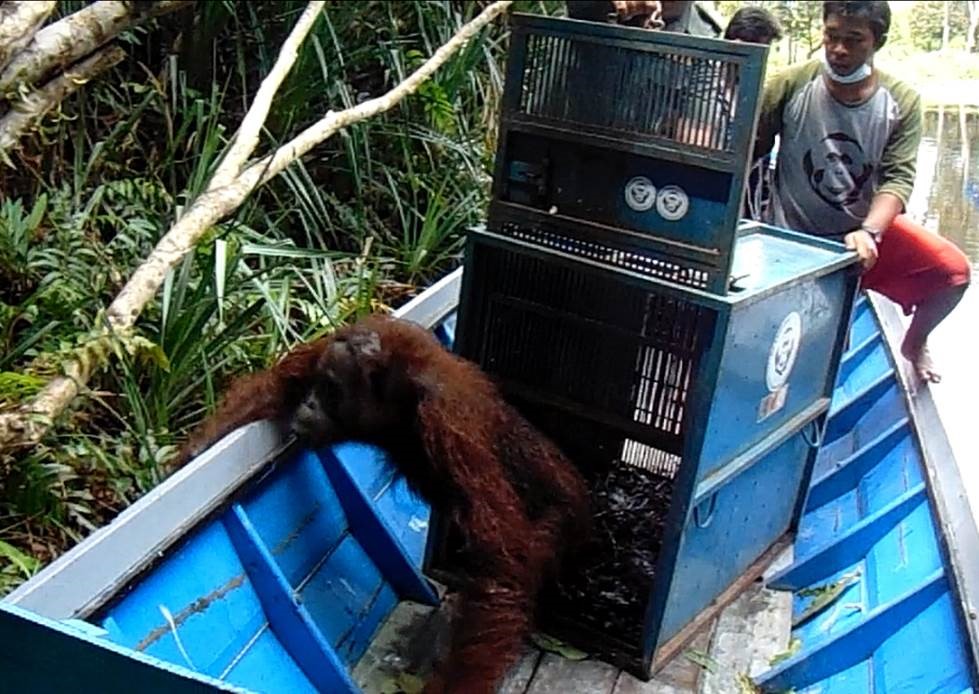
As soon as the transport cage door was opened she actively climbed into the nearby trees and disappeared into the forest.This, we hope, is her last encounter with humans.

The Lamandau Wildlife Reserve totals 158,144 acres of tropical forest and is home to a population of more than 500 orangutans. Half of these were reintroduced or translocated and given a second chance of survival in the wild. We must make sure they are stay safe. Please donate to our urgent appeal – DONATE TODAY
Protecting orangutan habitat
We only send out appeals when there is a real need for help – and right now, we urgently need funds to strengthen the protection of the Lamandau Wildlife Reserve, habitat of the critically endangered orangutan. In January and February, our forest patrol staff detected and tackled fires, deliberately lit to clear land, next to the reserve. They prevented the fires from spreading and saved thousands of acres of peat swamp forest from going up in smoke. In March, we met with the provincial government to push for those responsible for starting the fires, to be held to account.
The Lamandau Wildlife Reserve totals 158,144 acres of tropical forest. The Foundation's staff put themselves at risk as they battled to protect the forests, home to a population of 500 orangutans. Half of these were reintroduced or translocated by the Orangutan Foundation and given a second chance of survival in the wild. We must make sure they are safe.
It costs a quarter of a million pounds a year to protect the reserve and the wildlife. A significant commitment for a small charity, but a relatively small amount considering the invaluable riches and services the forests contain and provide.
The Orangutan Foundation runs and staffs eight guard posts in and around Lamandau to deter and prevent access to the forests. Our staff, all committed local Indonesian conservationists, patrol on foot or by boat. We use conservation drones and GIS to map and document illegal activities.
The map below shows the guard posts (red triangle on blue).
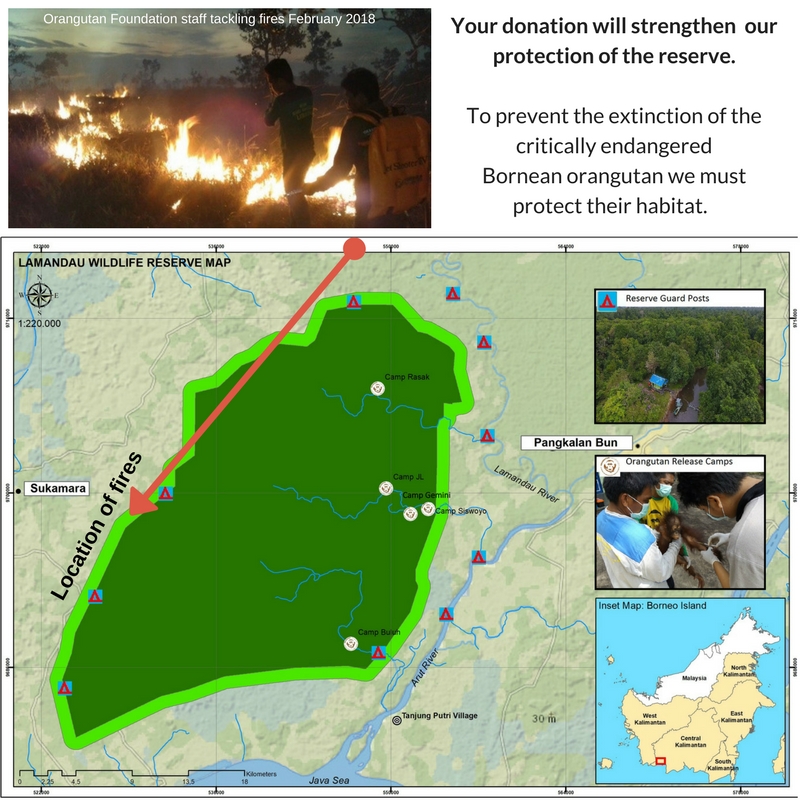
In 2017, we stopped illegal mining inside the reserve and since the beginning of 2018, our forest patrols have detected and stopped two cases of illegal logging.
Yet, despite years of investment in successful community awareness, there remain a small few who want to exploit the forest for their own interests. As pressure for land increases our fight to protect standing forest, to stop it being logged or converted to oil palm, will only become more difficult. Protecting Lamandau is an ongoing commitment: we cannot temporarily close a guard post due to insufficient funds, in the hope that we might start up again next year. If we stop protecting the reserve, we know that we will lose it: the forest and its precious wildlife could be gone in an instant.
Bangkal is one of the orangutans at risk. Originally released into the neighbouring Tanjung Puting National Park, Bangkal was severely injured in 2000 when illegal loggers attacked him with boiling-hot oil. Following a long period of recovery, he was released into Lamandau, at Camp Gemini, one of our five release camps in the reserve. Bangkal, now strong, healthy and independent, has since become the dominant male.Aan, an adult female, was shot and permanently blinded in an oil-palm plantation. Foundation staff moved Aan to the Lamandau Reserve, where she now lives with round-the-clock monitoring by our staff and vet.
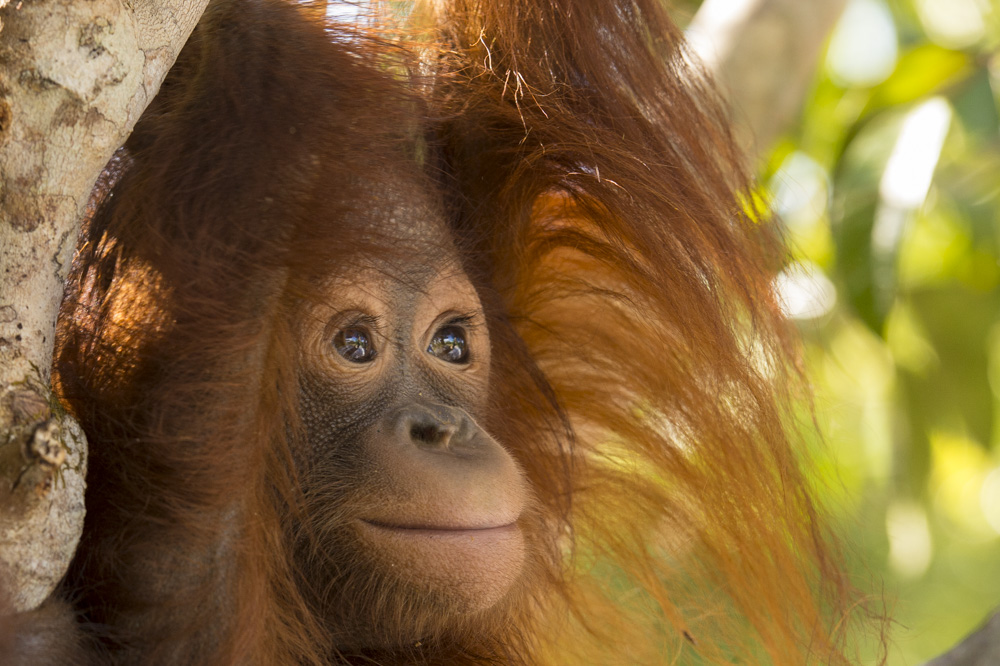
We also care for ten orphaned infant orangutans at our release camps - plus many dozens of reintroduced and translocated adults that are thriving in the wild under our protection. We owe it to these orangutans to keep their forest home safe.
Please DONATE SECURELY THROUGH OUR WEBSITE, by calling 020 7724 2912, or by sending a cheque payable to ‘Orangutan Foundation’ to Orangutan Foundation, 7 Kent Terrace, London, NW1 4RP. If you are unable to donate immediately but want to make funding pledge, whether through fundraising or a delayed donation, please contact us to discuss options – we will work with you however we can.
Sponsor the protection of Lamandau Wildlife Reserve
- £15 protects 10 acres of forest for one year
- £37.50 protects 25 acres of forest for one year
- £75 protects 50 acres of forest for one year
- £150 protects 100 acres of forest for one year
We must act today to secure the future for orangutans, forests and people.
With sincere thanks,
Ashley Leiman OBE
Founder & Director/Trustee
![]()
Volunteer in Borneo with Orangutan Foundation in 2018
We are looking for a few more adventurous individuals to join our volunteer team in Borneo. This year's project is the renovation of a forest guard post in the Lamandau Wildlife Reserve. Volunteers will be working and living on the site, which is a beautiful remote location in the middle of the forest. You will wake up and go to sleep to the sounds of the forest.
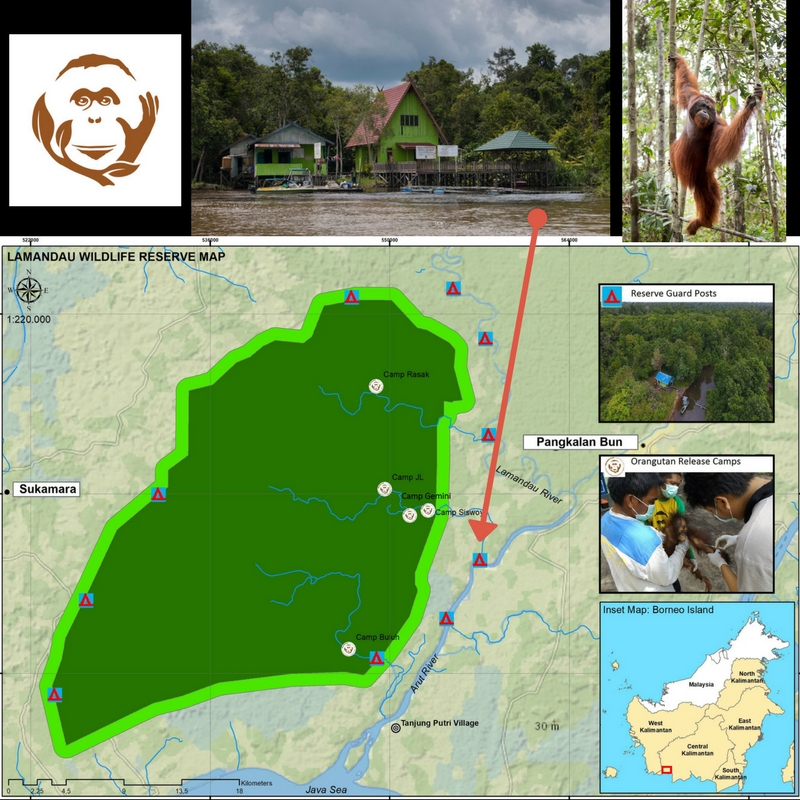
Last November, The Guardian ran an article featuring a first-hand account from one of our volunteer. It is well worth a read if you are interested in volunteering. https://www.theguardian.com/travel/2017/nov/01/borneo-voluntourism-holiday-orangutan-foundation
Orangutan Foundation does not allow any of its volunteers to have direct contact with orangutans and this is for the benefit of the apes. Most people understand this and can see the bigger picture of what they are doing. Watch Orangutan Foundation’s Cathy Smith talking at Compass Ethical Travel Conference about ethical volunteering. https://www.youtube.com/watch?time_continue=213&v=3KM4ZBLvo38
If you want to spend a unique 3 weeks doing something worthwhile for orangutan conservation and see orangutans in the wild, then why not make this the year to join us? To find out more please click here or contact us.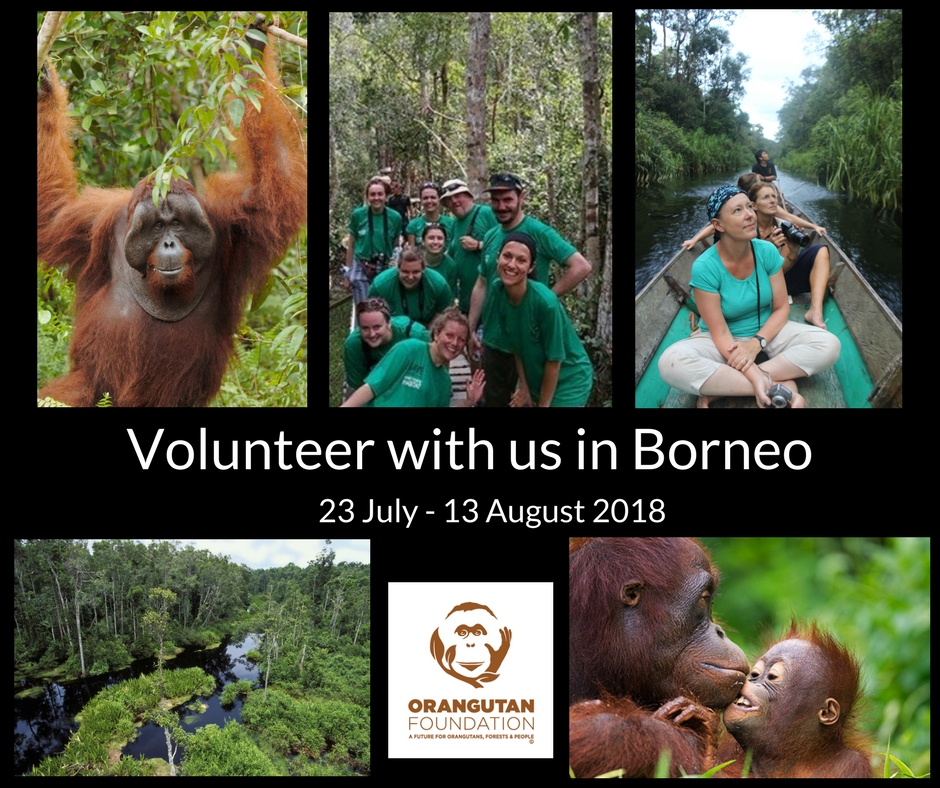
Forest fire spreads to orangutan habitat
Fires, deliberately lit next to an oil-palm plantation, have spread to the Lamandau Wildlife Reserve, home to over 500 critically endangered orangutans. This is the second fire this year. Please donate to help us.
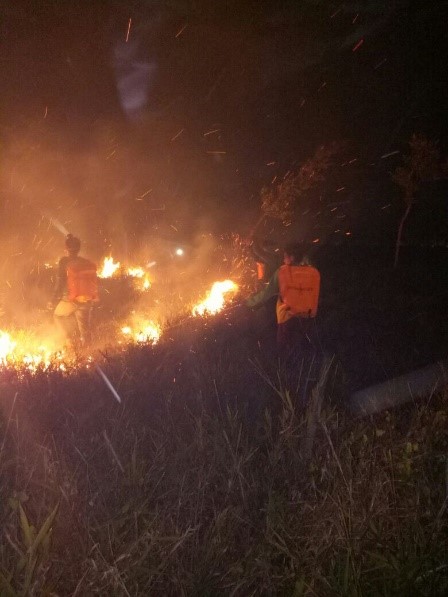
The Orangutan Foundation's guard post staff spent yesterday evening and all last night fighting the fires. We can't thank them enough for their bravery and efforts to protect the Wildlife Reserve. The fire, as the map below shows, was on the other side from our Orangutan Release Camps and so our young orphaned orangutans and Aan, the blind orangutan, are safe. However, other wild orangutans and species will have been harmed by these fires.
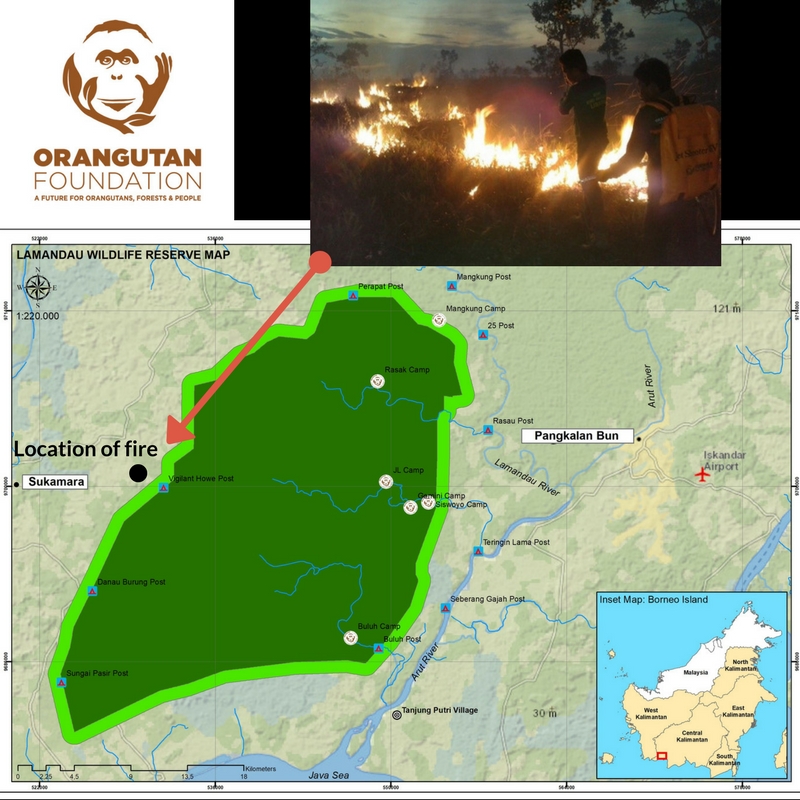
We are alarmed that fires have been lit in the first place but are spreading so easily, especially at this time of the year. It is meant to be the wet season but the scrub land, just bordering the reserve, and the forest, inside the reserve, is unusually dry due to lack of rain. In 2015, an El Nino year, over 11,000 hectares of the reserve burnt. This cannot happen again.
At around 18.00 hrs yesterday our guard post staff at Post Vigilant Howe detected fires about 3 km outside the boundary of the Lamandau Wildlife Reserve. The fires are thought to have started near to PT Sampurna oil-palm plantation.
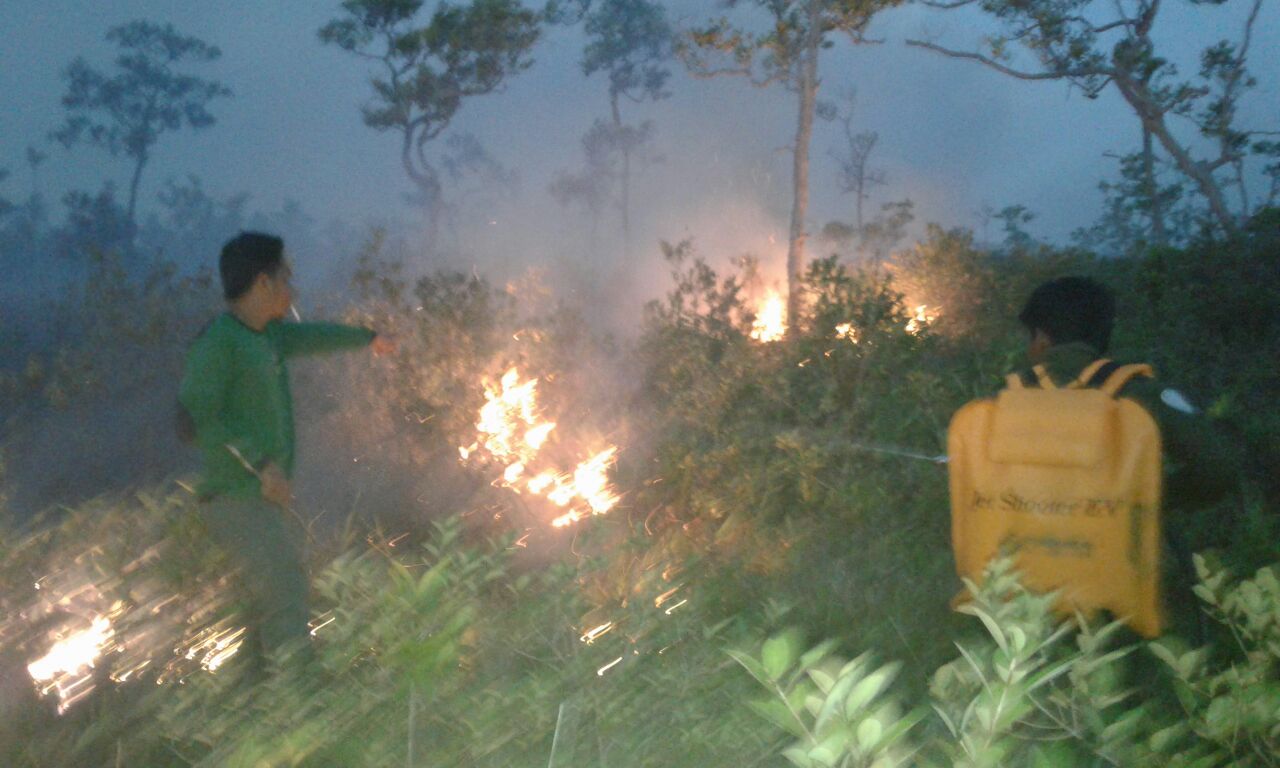
Our staff from Guard Post Danau Burung and Government Resort staff BKSDA SKW II from Guard Post Sungai Pasir tried to extinguish the fires for 3 hours using water jet pack shooters. At 20.00hrs they realised the fire was growing due to the wind and ready fuel of dried shrubs and grass. They informed the Head of BKSDA Resort SKW II, Mr. Sugih Trianto and requested extra help. Our staff from Guard Post Perapat and even our Forest Restoration Manager, Anto, went to help tackle the fires.
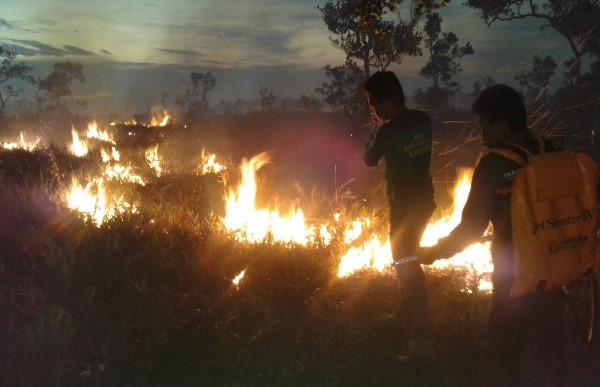
At around 03.00hrs the fire was eventually extinguished by an exhausted team, made up of Orangutan Foundation and staff of BKSDA SKW II.
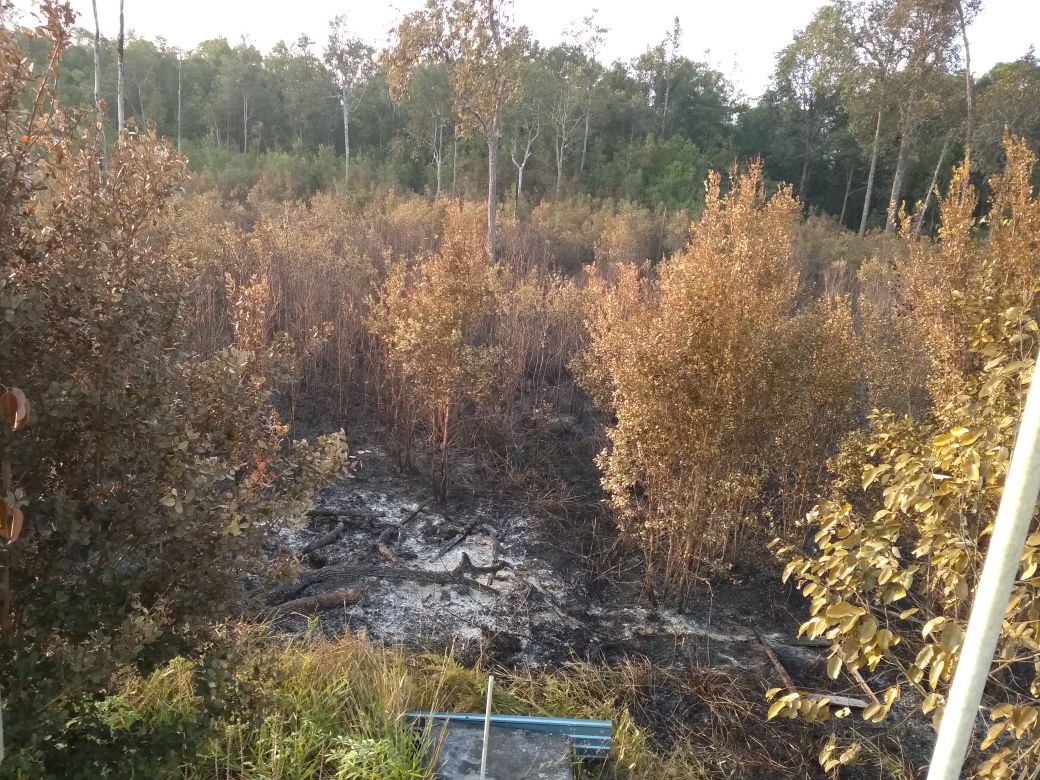
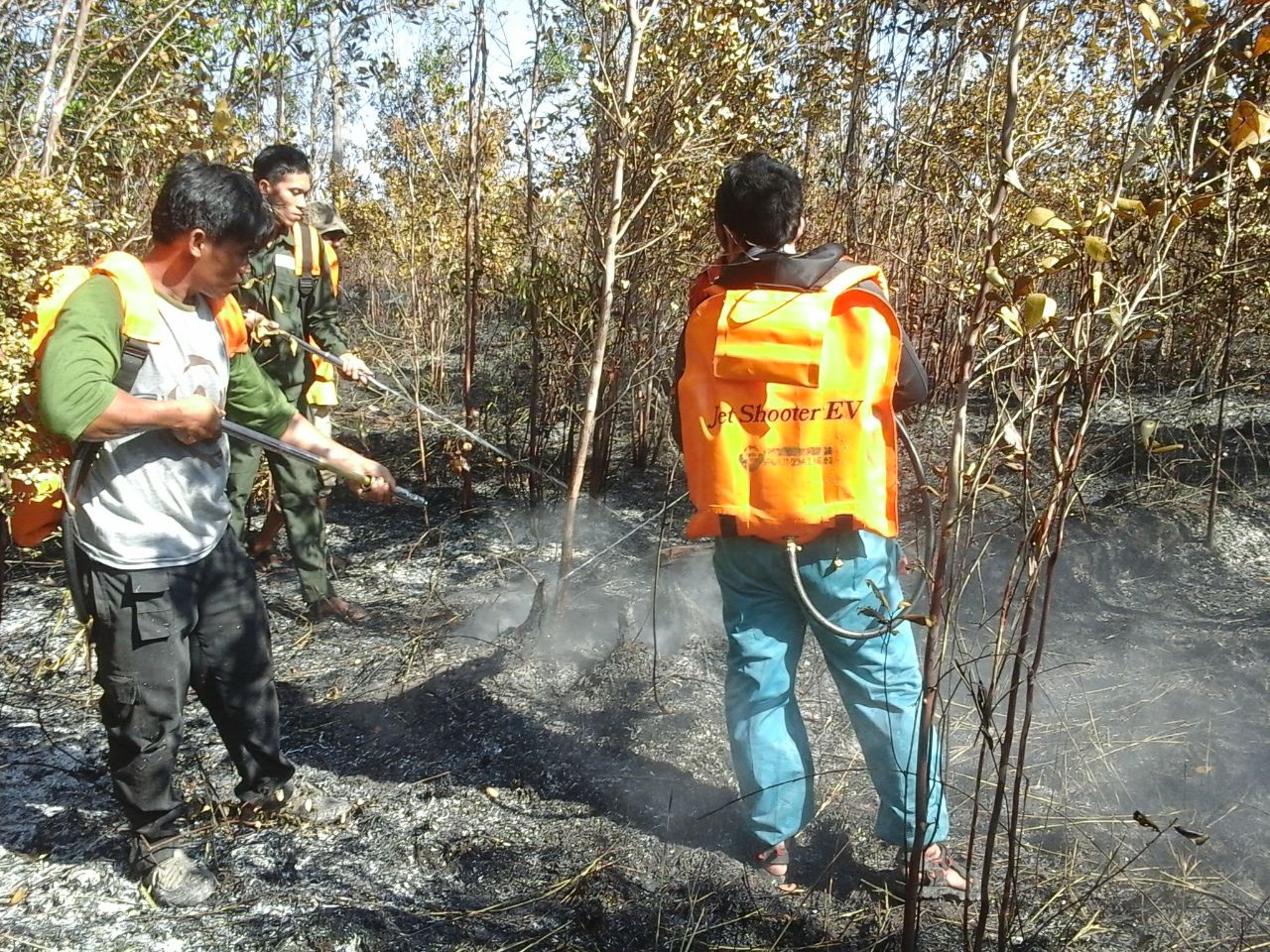
At 10.00 hrs today our team returned to the location of the fire and extinguished any smouldering vegetation. The fires were very close to our Guard Post Vigilant Howe. Using GPS, the total area of the fire was 61 hectares, which is the equivalent to the area of 150 football pitches.
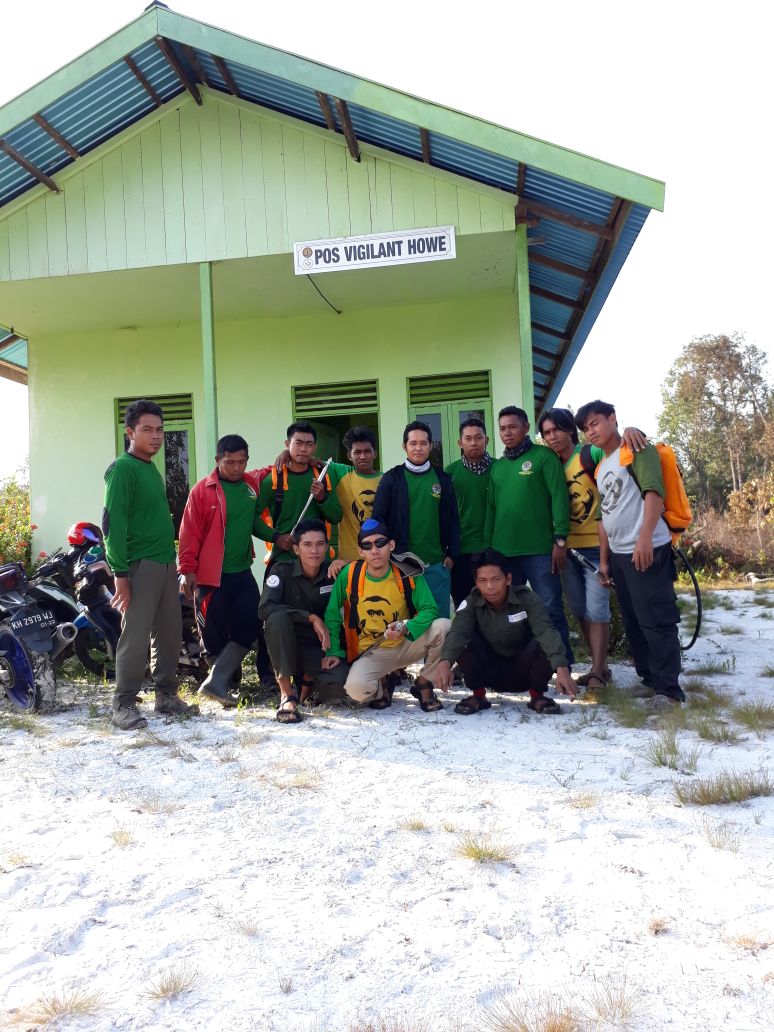
At a time when orangutan numbers are falling dramatically we need to ensure their habitat is safe. This is the second fire this year alone and we have also detected and stopped 2 cases of illegal logging. Help us to protect these forests and orangutans. If you can, please consider making a regular donation. Donate today
Thank you,
Orangutan Foundation
Baby orangutan born
We are delighted to announce the arrival of another baby orangutan born into the protected Lamandau Wildlife Reserve, Indonesian Borneo. Our staff believe the orangutan was born on 26th January. Mother, Holahonolulu (Hola for short) was seen with her new infant at Camp Gemini's feeding site. We think the father is likely to be Bangkal, the dominant male, as they were seen mating on several occasions.
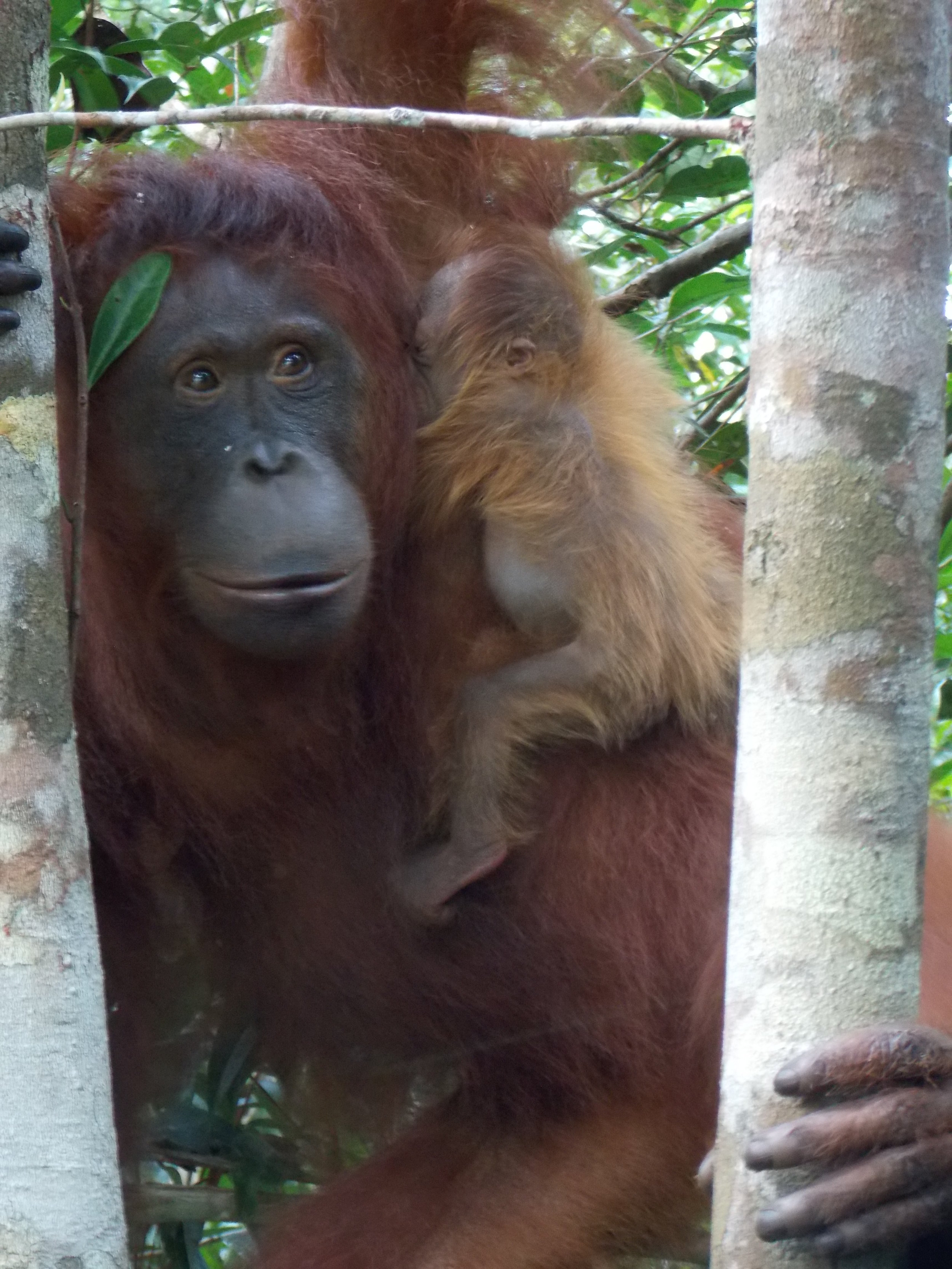
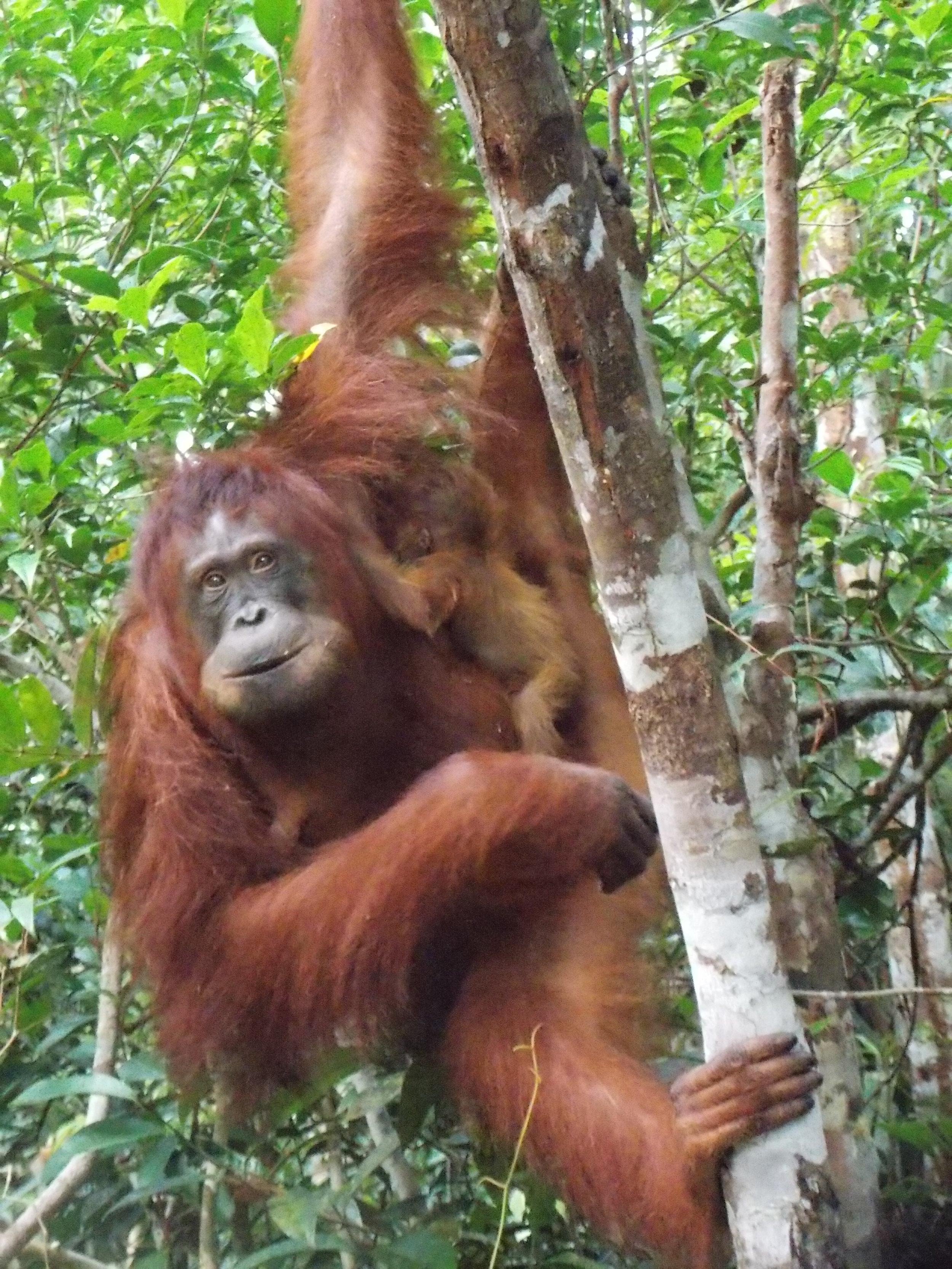
Both Hola and her baby looked healthy. Hola ate a lot of fruit, the extra energy needed for milk production. As yet, our staff could not tell what sex the baby was.
Hola was born in the wild in December 2004 and her mother was Huber. Huber was rehabilitated by OFI and was released into the Lamandau Wildlife Reserve in December 1999, but she has since passed away.
Our staff have yet to name Hola's new baby so we thought we would ask for your help. Send us your suggestions (leave a comment), it must start with an H and be a unisex name. We will decide on Monday 5th February.
Help us to ensure these orangutans remain in the wild and that their forest home stays protected. Click here to donate today!
Orangutan Foundation - a future for orangutans, forests & people
Vet's first orangutan rescue
The Orangutan Foundation is delighted to welcome Dimas Yuzrifar as its new vet, replacing Dr Steven, who has now returned to Bali. Being "thrown in at the deep end" is certainly how the first week has been for Dr Dimas! Last weekend we received reports of a wild orangutan in village forest. This was passed onto the government agency for wildlife, BKSDA SKW II Pangkalan Bun.
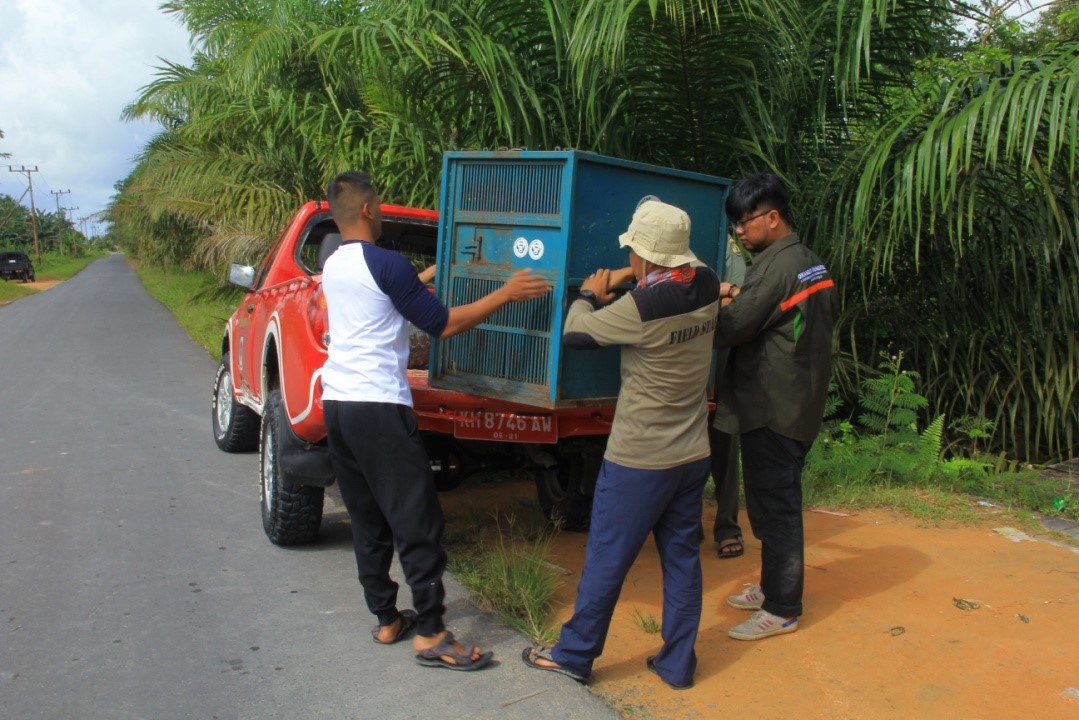
The orangutan was found close to oil palm, banana and rubber plantations owned by local residents. The villagers feared the orangutan would damage their crops and so BKSDA decided, in this case, to capture and move (translocate) the orangutan, to avoid any conflict arising. Dr Dimas managed to anesthetize the orangutan. After being caught the orangutan was identified as female with an estimated weight of around 25 kg. The next day after checking the orangutan was well and active she was released into the safety of the protected Lamandau Willdife Reserve.
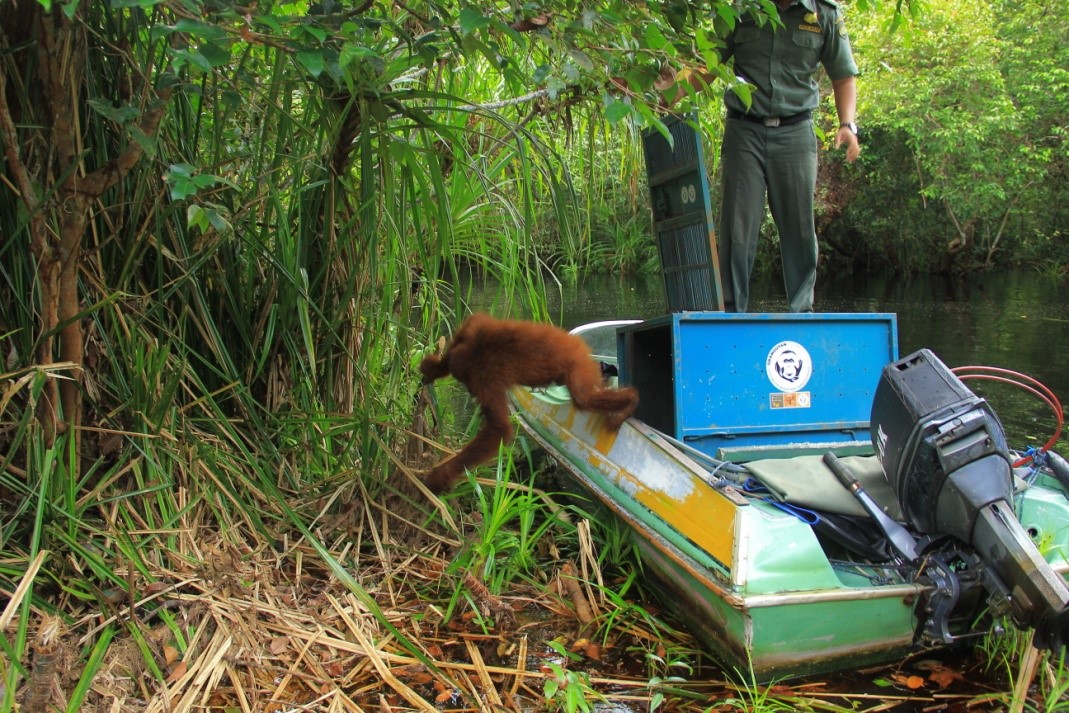
Watch this clip to see how quickly the orangutan leaves the transport cage and disappears into the forest.
After the busy weekend with the translocation, Dr Dimas also spent time meeting and checking up on the young orangutans in our release camps. Here's a clip of young Satria playing in his night-time enclosure.
Wonder what the next week will have in store?
Thank you for supporting our work.
Donate to help us keep the Lamandau Wildlife Reserve and its precious orangutans and wildlife protected. Click here to donate - thank you.
Orphaned infant orangutans "at home" in the forest.
“When Adib, an orphaned infant orangutan, arrived at the end of October he was afraid of climbing in the trees. Within two months he is much more confident and now seems very at home.” said Azhari Purbatrapsila, manager of the Orangutan Foundation’s Release Programme. In this blogpost, Azhari shares his observations of some of the characters in soft-release.
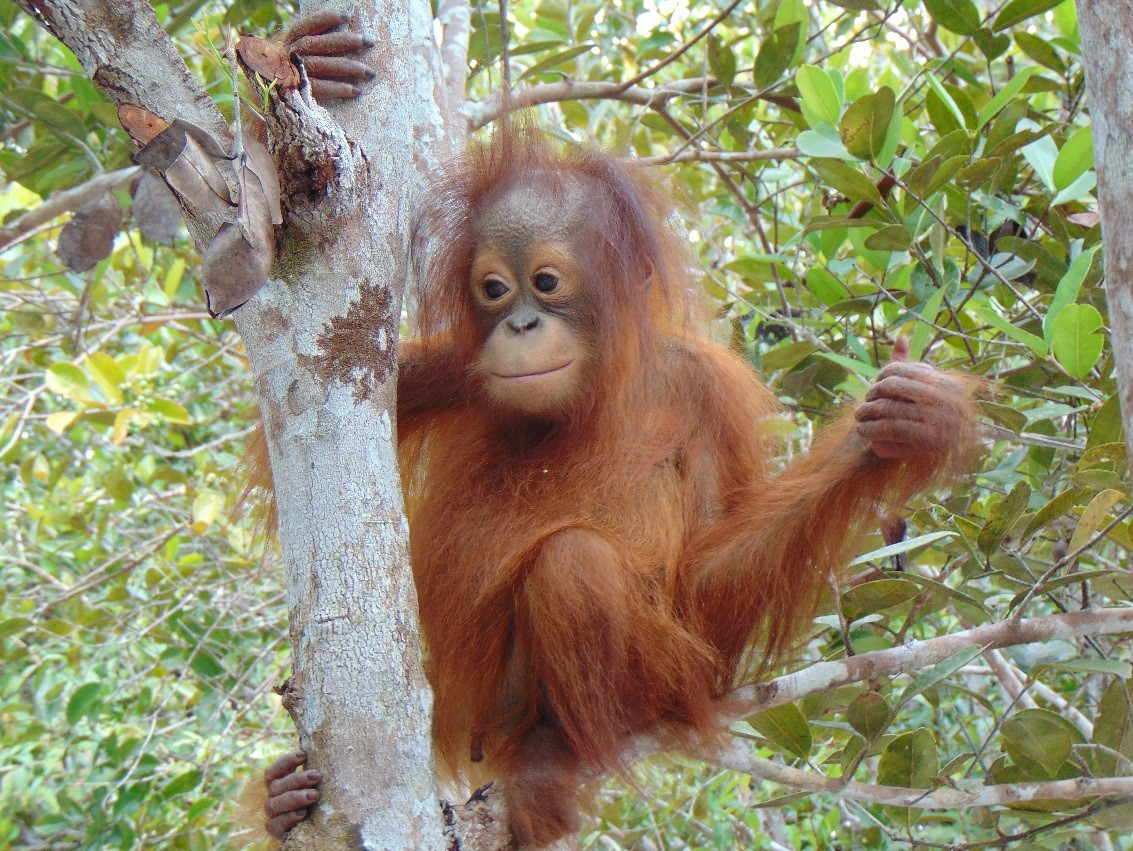
The Orangutan Foundation run 5 release camps within the Lamandau Wildlife Reserve, Indonesian Borneo. Here, infant orphaned orangutans undergo a soft-release process, allowing them time to learn the skills to survive in the wild.
Adib: He can climb high to the tree top. Sometime he plays with orangutans Mona and Timtom but he mainly loves to play alone since the other orangutans are bigger and stronger than him. (Watch Adib's first climb)


Mona: Mona is making great progress. Just after she moved out from her sleeping enclosure, Mona climbed a tree and straight away started bending the branches. She made a tiny nest. Not long after the nest had broken with the branches springing back to their original position. She still doesn’t have enough strength to break the branches and make a firm nest. But still, this is a really good improvement from her!
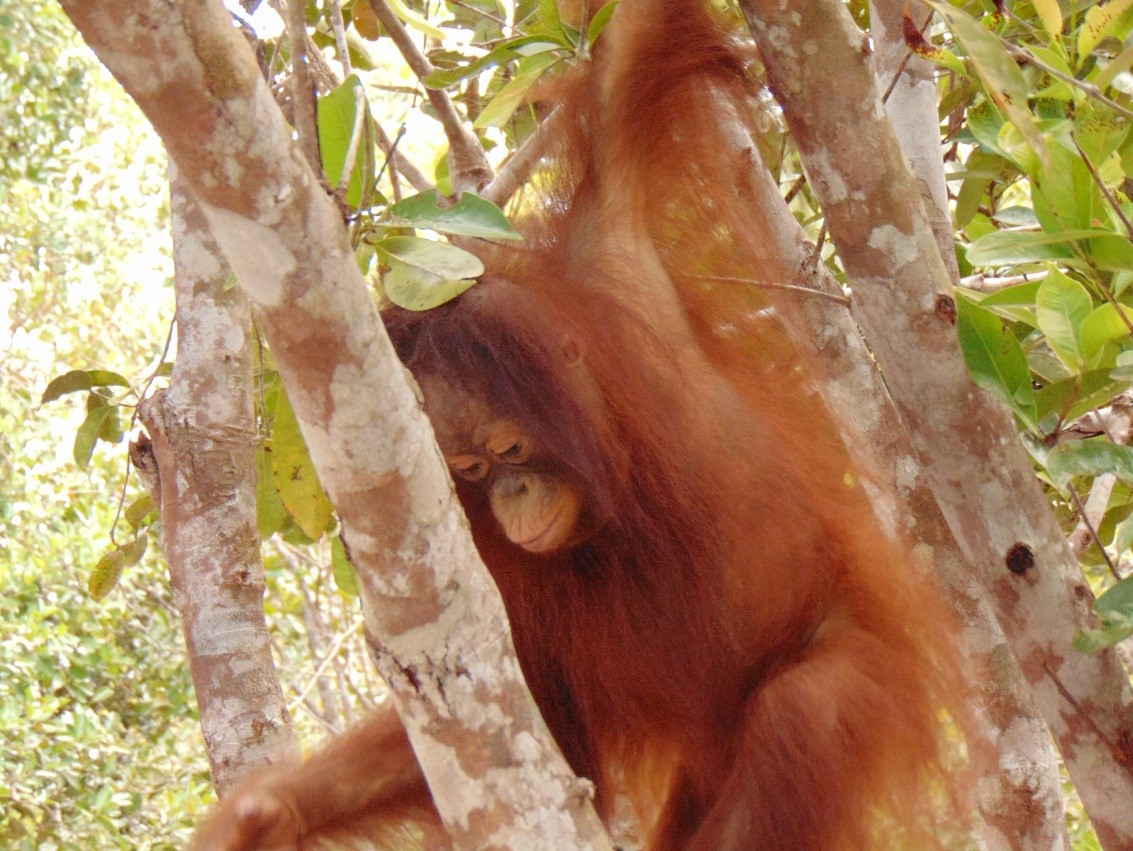
Timtom: Like Adib, Timtom likes to play alone but she will play will Mona or Adib. She plays in the lower tree branches, even though she can climb to the top. Being cautious, she never ventures far.

Boy & Nyunyu: Boy and Nyunyu are two of the biggest and strongest of the orphaned orangutans, which explains why they are best buddies. They are very active and spend almost all their time playing together so much so that it is often difficult to get them back in at night! An encouraging sign though.
Please donate to support our work helping these orangutans return to the wild. Thank you to all our members and supporters for their ongoing support.
Challenging but successful orangutan rescue from beach resort
“As the pictures came through on WhatsApp and I saw an image of a beach I wondered what our rescue team had been up to!” - Ashley Leiman (Orangutan Foundation director.) A lone adult orangutan had been reported close to a beach resort where villagers were threatening to capture and harm it.
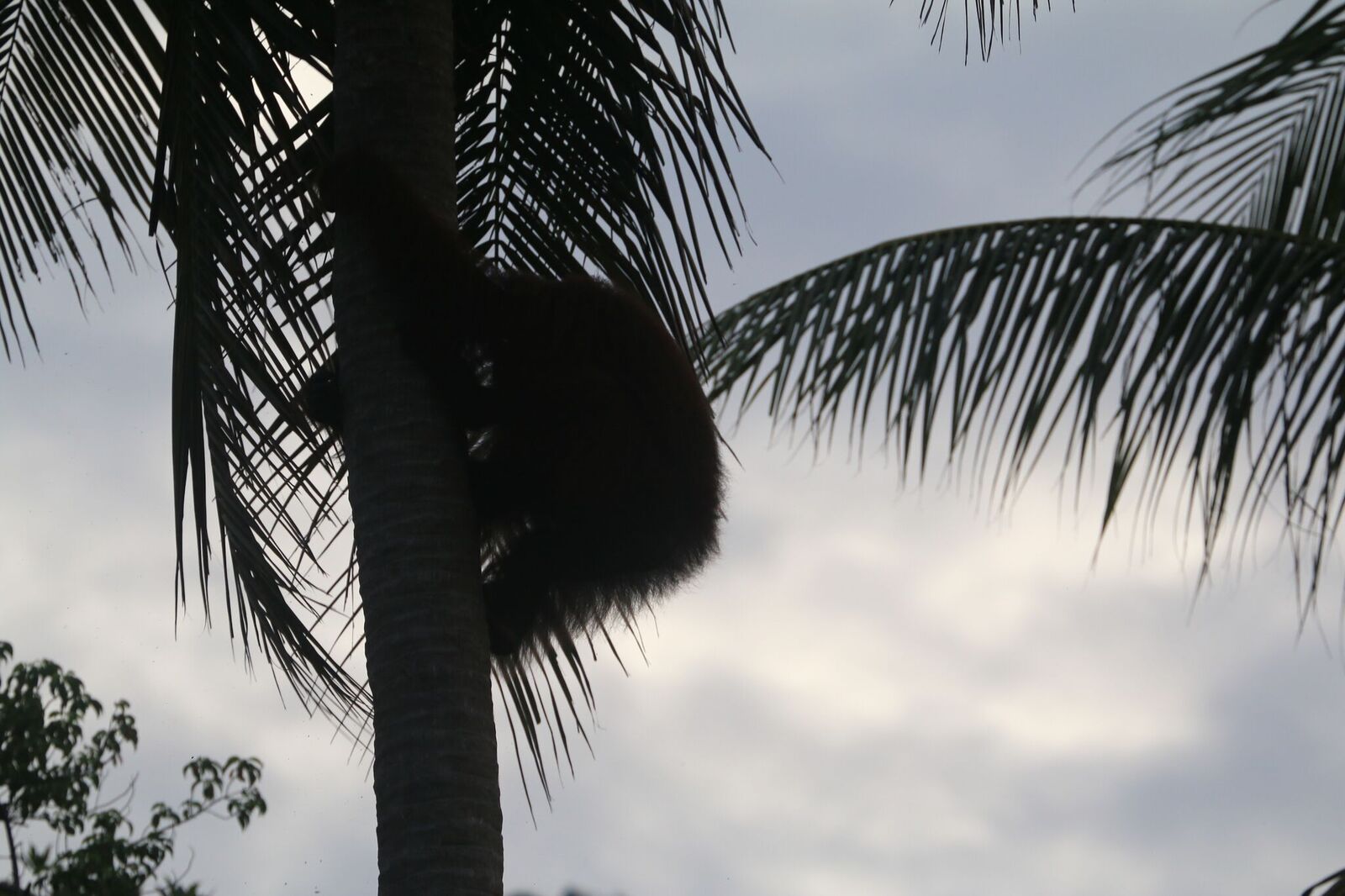
After receiving the call for help from the Wildlife Department (BKSDA SKW II), in Central Kalimantan, Indonesian Borneo, our vet and rescue staff had to drive, for 5 hours, through the night, to the town of Sampit.
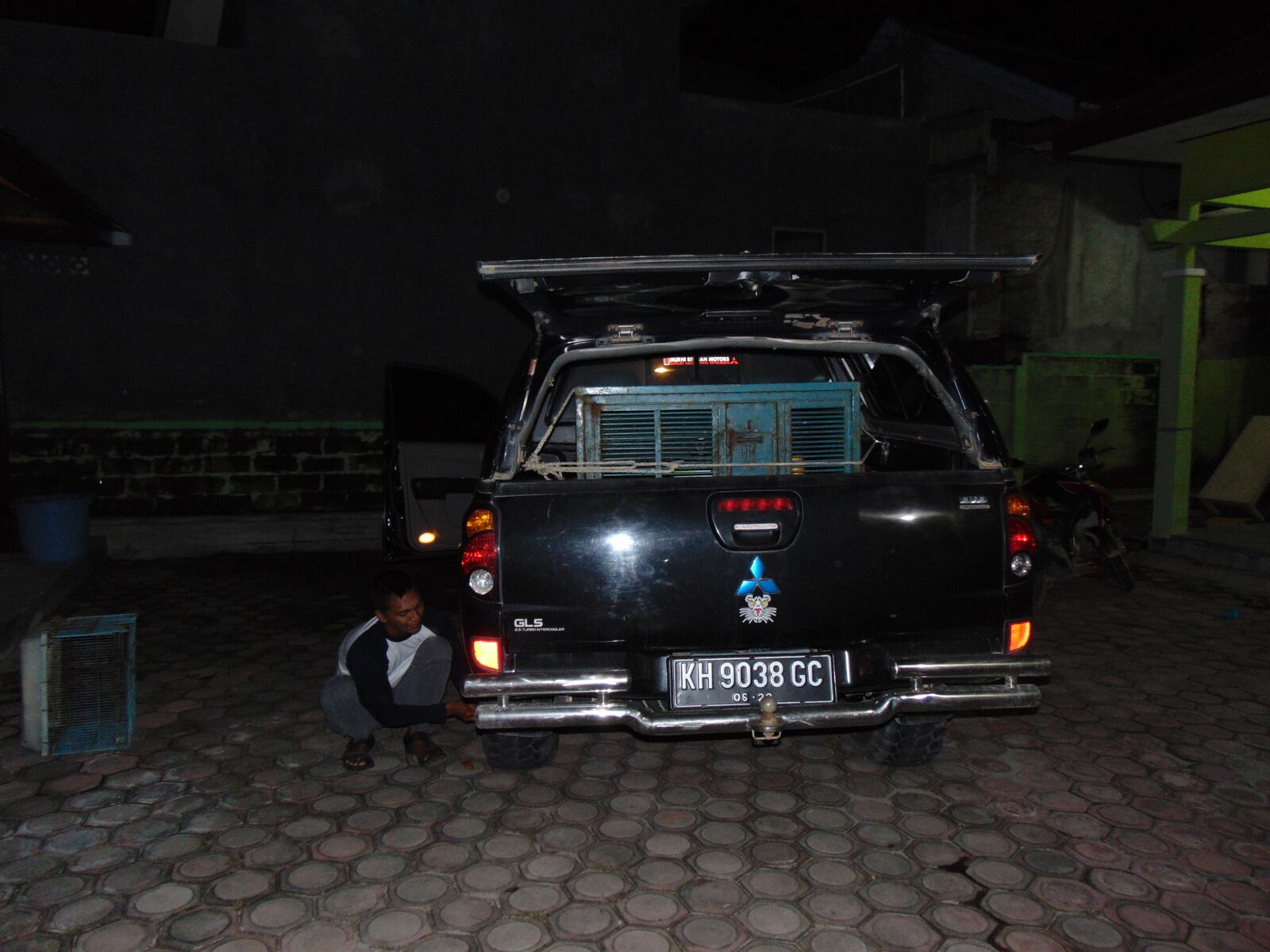
The team made a rescue plan and set off at 3am to where the orangutan was last seen. They found the orangutan’s nest and traces of faeces, but the orangutan was nowhere to be seen.
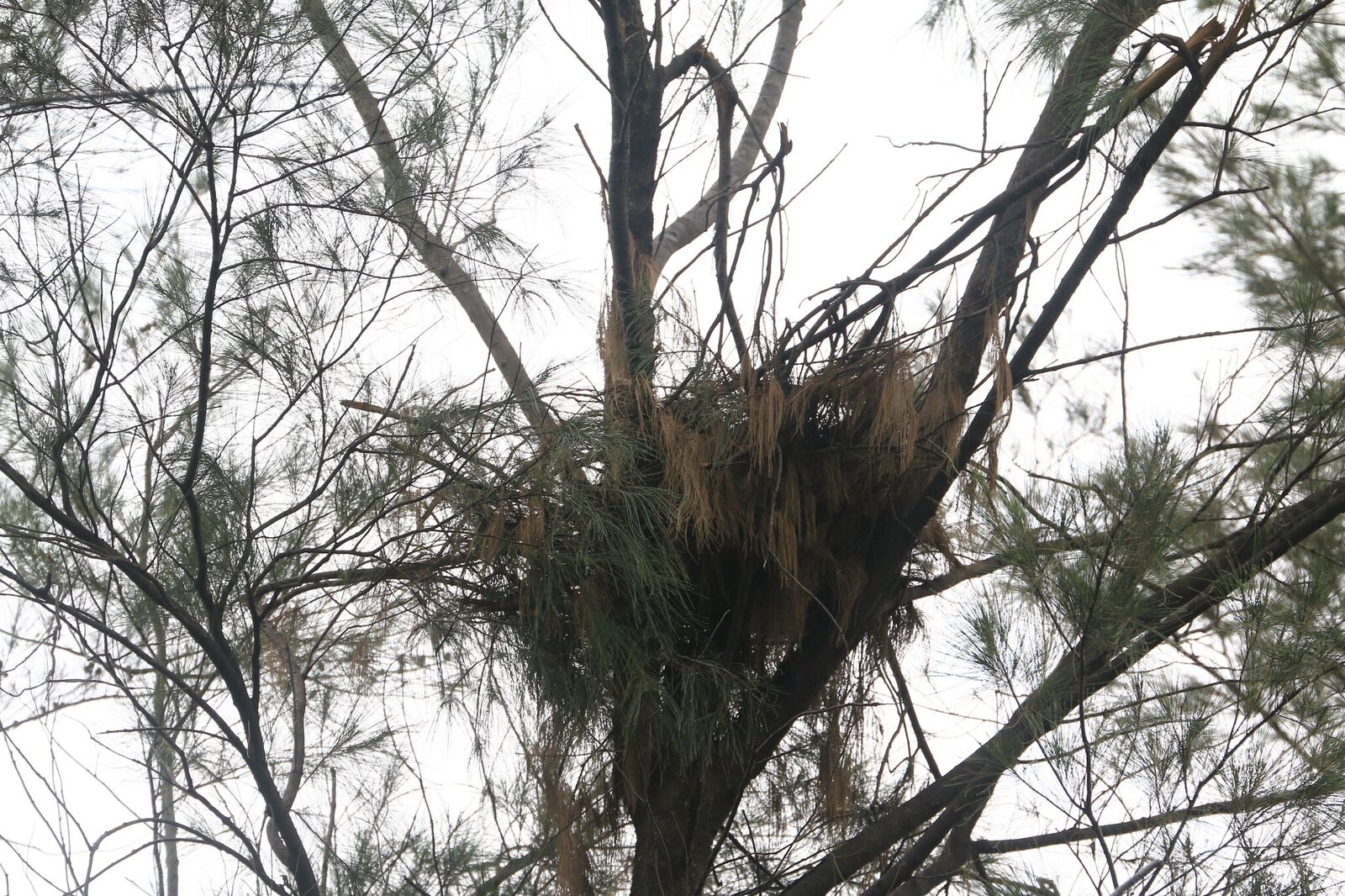
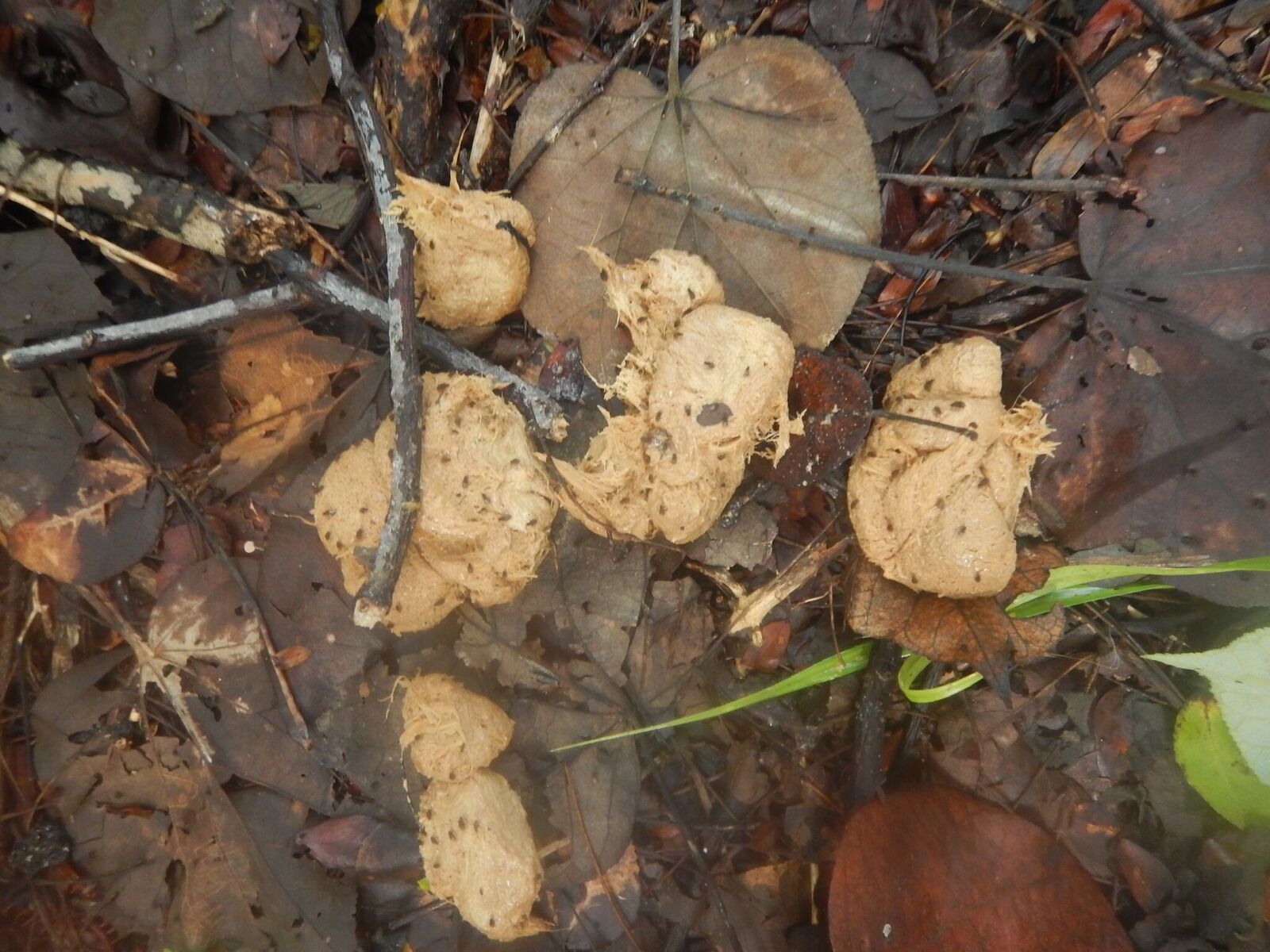
After 10 hours of searching, the orangutan was finally spotted in a small patch of mangrove forest. No wanting to lose her again, Orangutan Foundation’s vet had a dart gun ready.
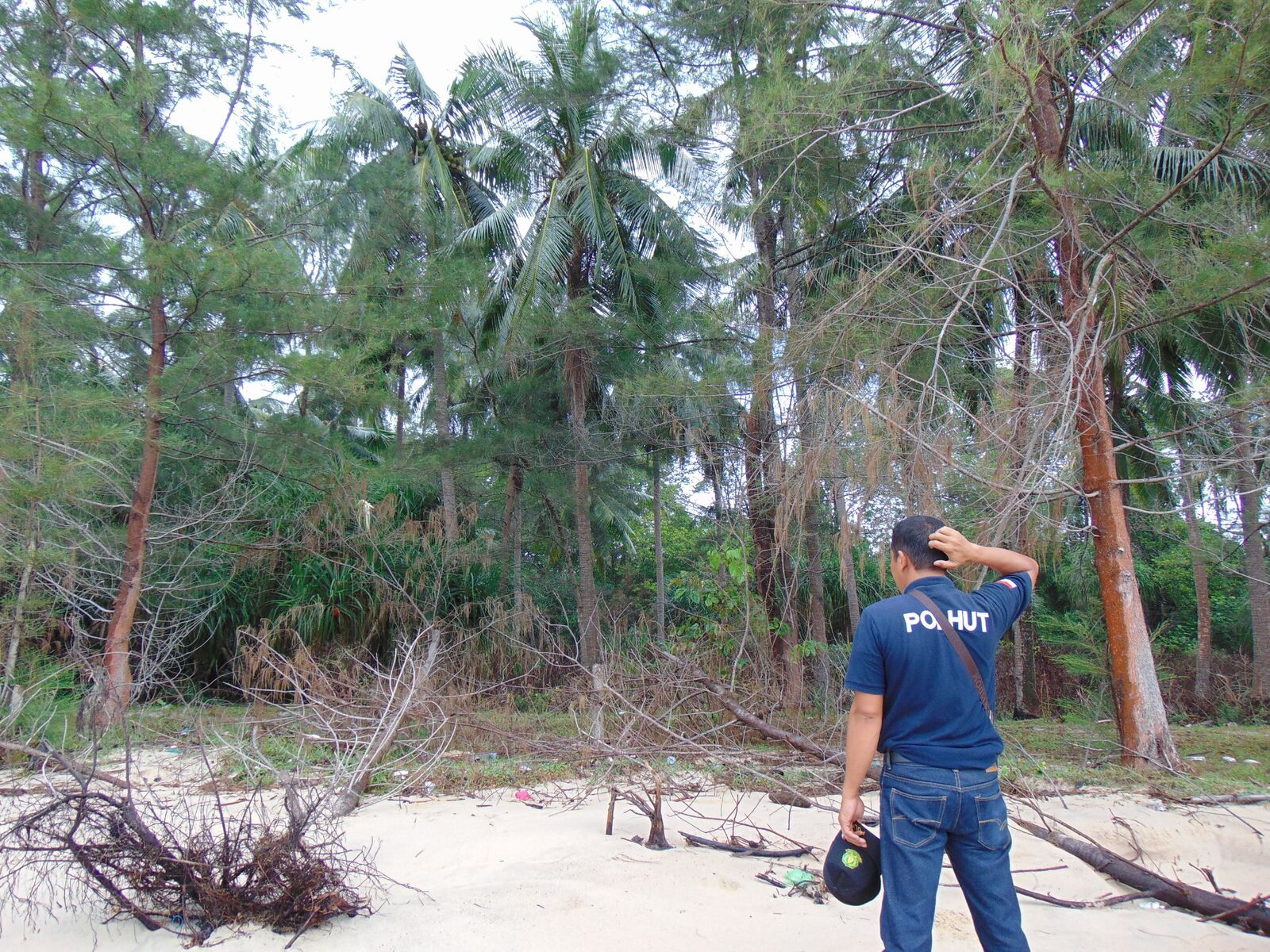
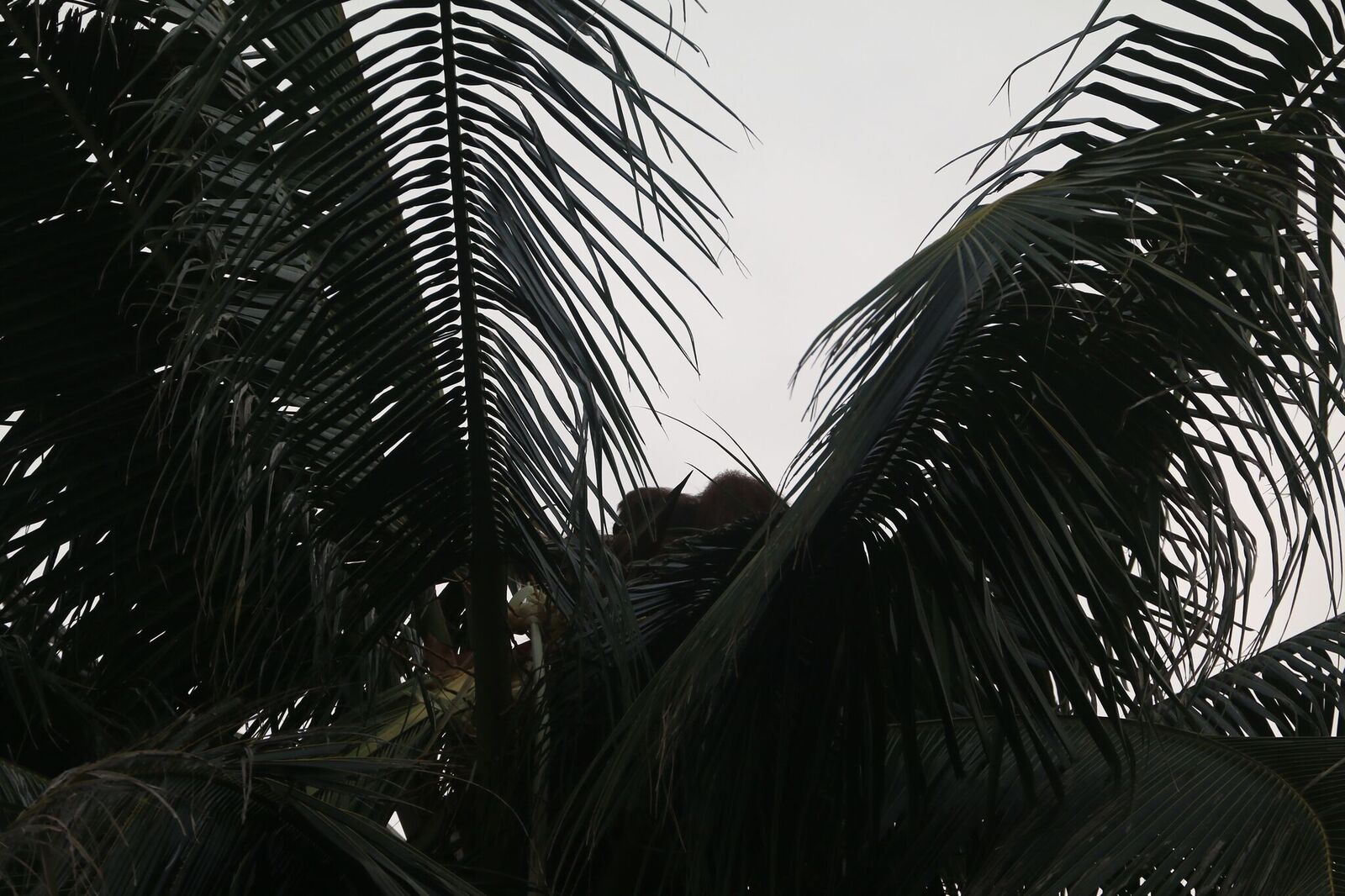
The orangutan was successfully darted, caught and then quickly examined by the vet for injuries.
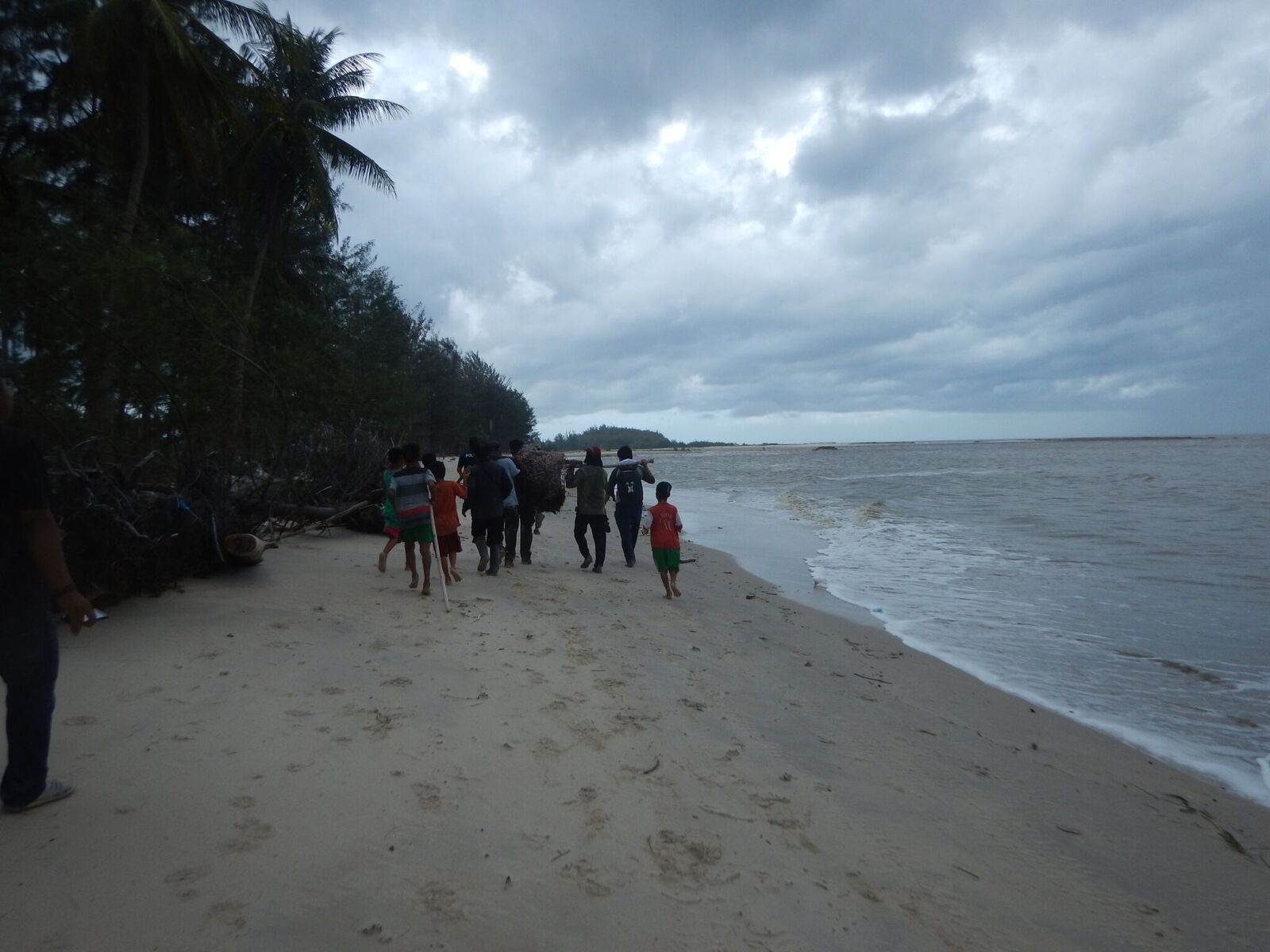
Our vet gave her another examination and confirmed she was female, healthy and in a fit condition. He gave her vitamins and worming medicine and blood samples were taken.
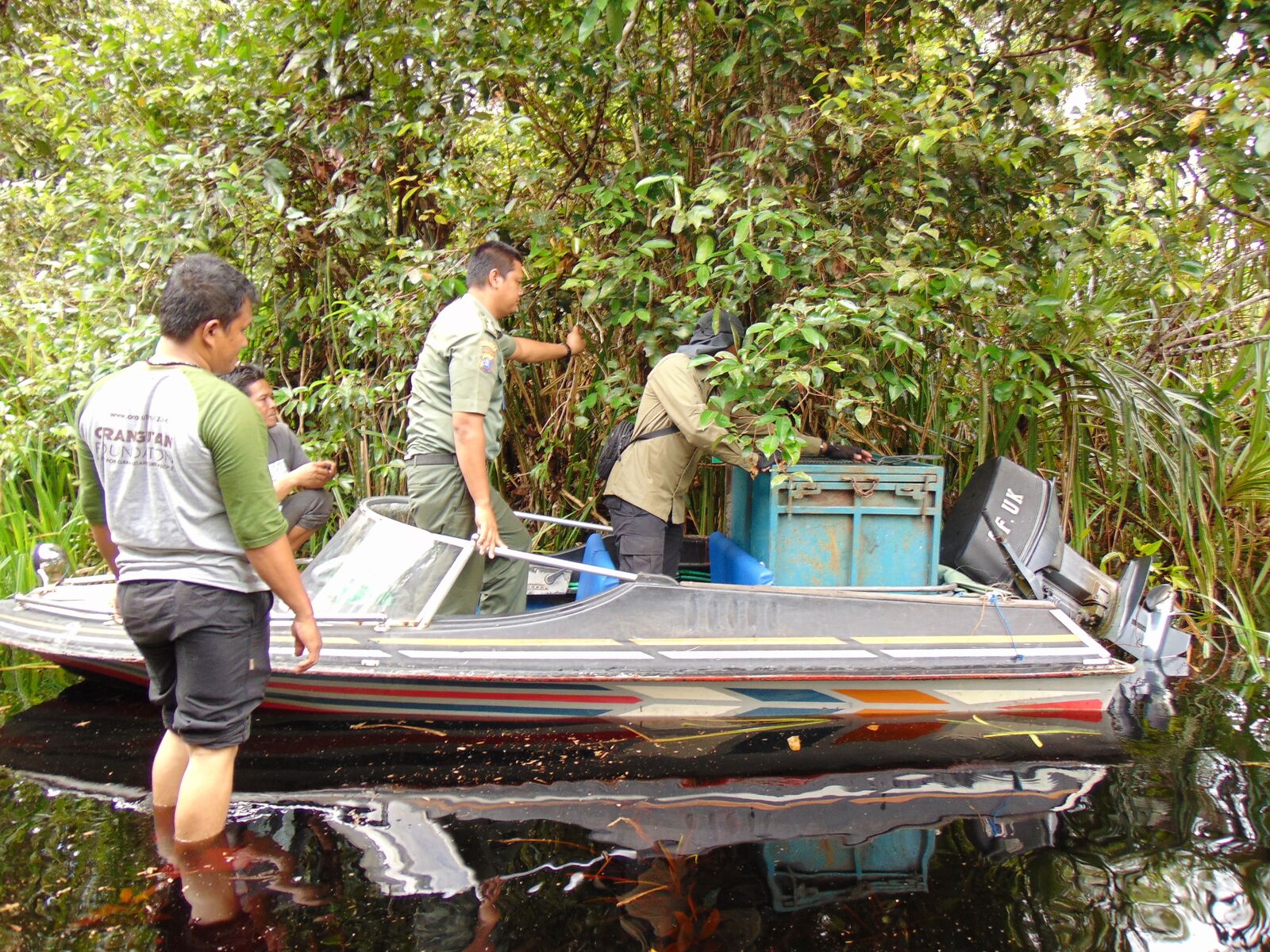
She was then transferred into a holding cage, for the long drive back to Pangkalan Bun, to the Wildlife Department’s head office.
Bornean orangutans are critically endangered due to the destruction and fragmentation of tropical forests. As they lose their forest home they are forced into contact with humans, often resulting in injury or death for the great ape.
We have rescued many orangutans, but this is the first time an orangutan has been rescued from a nearby beach. Luckily, for this orangutan, she was taken by boat to the protected Lamandau Wildlife Reserve. As soon as the cage door was opened she clambered straight up the nearest tree and disappeared into the forest canopy.
The wildlife reserve, is home to an estimated 500 orangutans, and the Orangutan Foundation actively protects it with guard posts, forest patrols and conservation drones.
Please donate now to support our work.
"All my days in the field are special, but on occasion something really exciting happens - a fight between two male orangutans and we were able to film it." - Ashley Leiman OBE
No sooner had our speedboat arrived at Camp Buluh when the staff came running and excitedly told us to hurry up. I knew before I reached the end of the jetty by the noise of breaking branches that something was going on in the forest ahead.
It didn’t take me long to see one huge male being pursued by another, both cheek padded. The assistants told me that they were Yoko, who was often seen around Camp Buluh, and Darwin, who hadn’t been seen for a number of years.
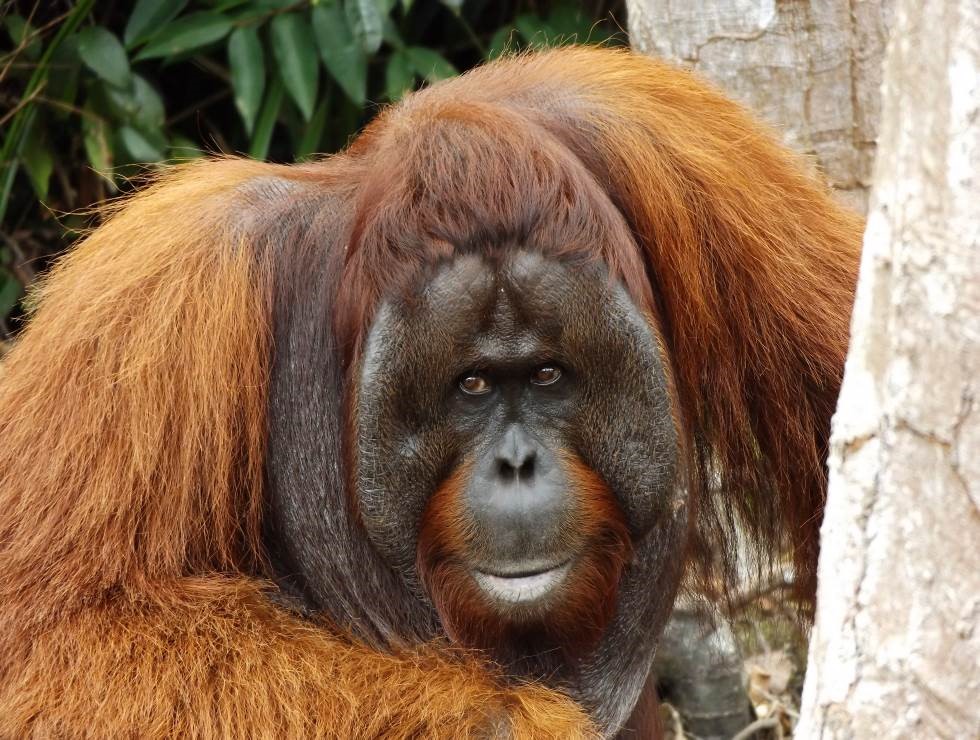
The orangutans were face-to-face in open combat. They would grapple one another, no doubt inflicting some injuries. This would last for a number of minutes until one would go further into the forest and there would be a lull in the confrontation.
There were times when both came down to the ground, one aggressively pursuing the other, before going back up into the trees. What was interesting was that during the conflict they would occasionally stop to rest, so obviously this activity takes a lot of energy.
Long calls and branch cracking perforated the performance. This encounter went on for over two hours before Darwin, realising Yoko had the upper hand, made his way further into the forest and was not followed. That’s what I love being in the field, it’s never boring, it’s not every day one sees such excitement.
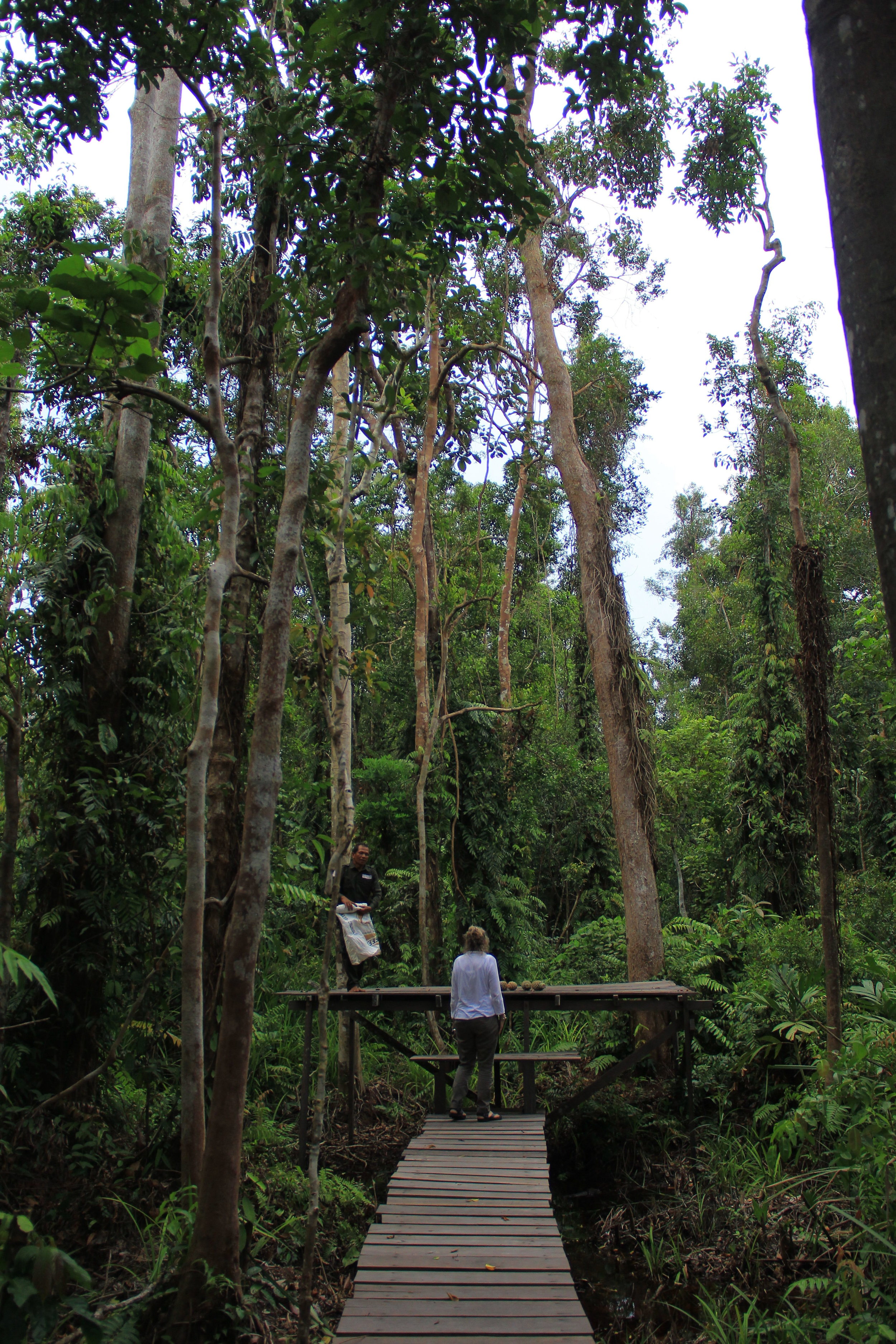

Become a Guardian of Lamandau today and help us protect the home of Yoko, Darwin and over 500 other critically endangered orangutans. Click here to find out more.
Thank you.
Ashley Leiman OBE, Director
Have your donation doubled for free and support Borneo's wildlife conservationists
From 28th November until 5th December you can DOUBLE your donation through the Big Give Christmas Challenge, at no extra cost to yourself. Click here to donate and double your impact to support our work. This year our we are raising funds to inspire Borneo’s future conservationists. In this clip Arie, Research Manager of Pondok Ambung, our tropical forest research station in Tanjung Puting National Park, explains why it is important.
We use camera traps to monitor the wildlife in the forests surrounding Pondok Ambung. Watch this short clip to see some of the species we’ve managed to capture on film!
To protect Indonesia’s biodiversity, future conservationists need to be encouraged and supported.
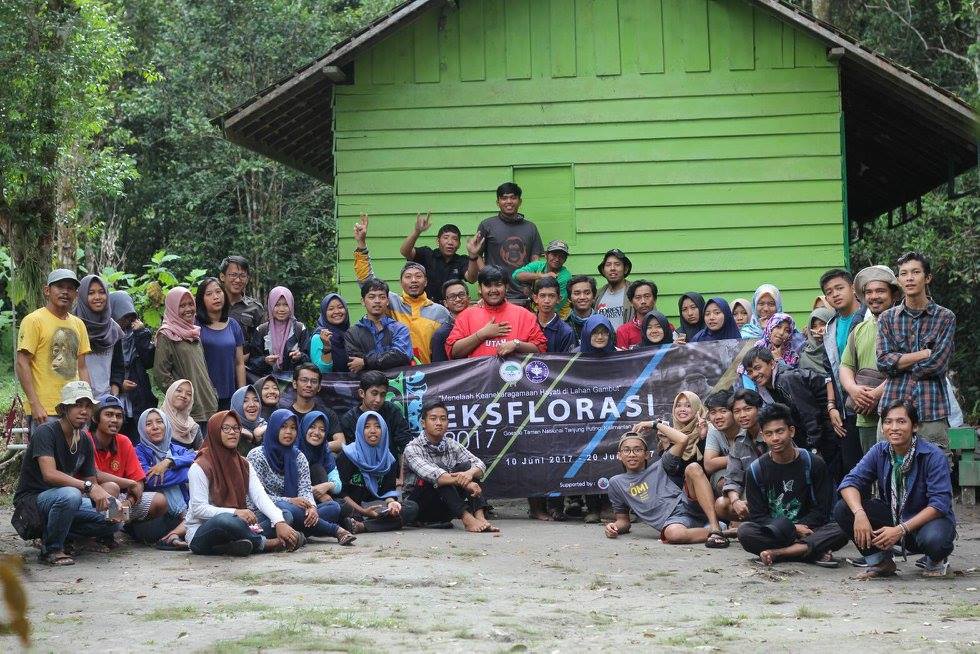
Our research station is a base from where Indonesian students and international scientists can conduct research. Take a virtual tour below:
Please help us to ensure a future for orangutans, forests and people.
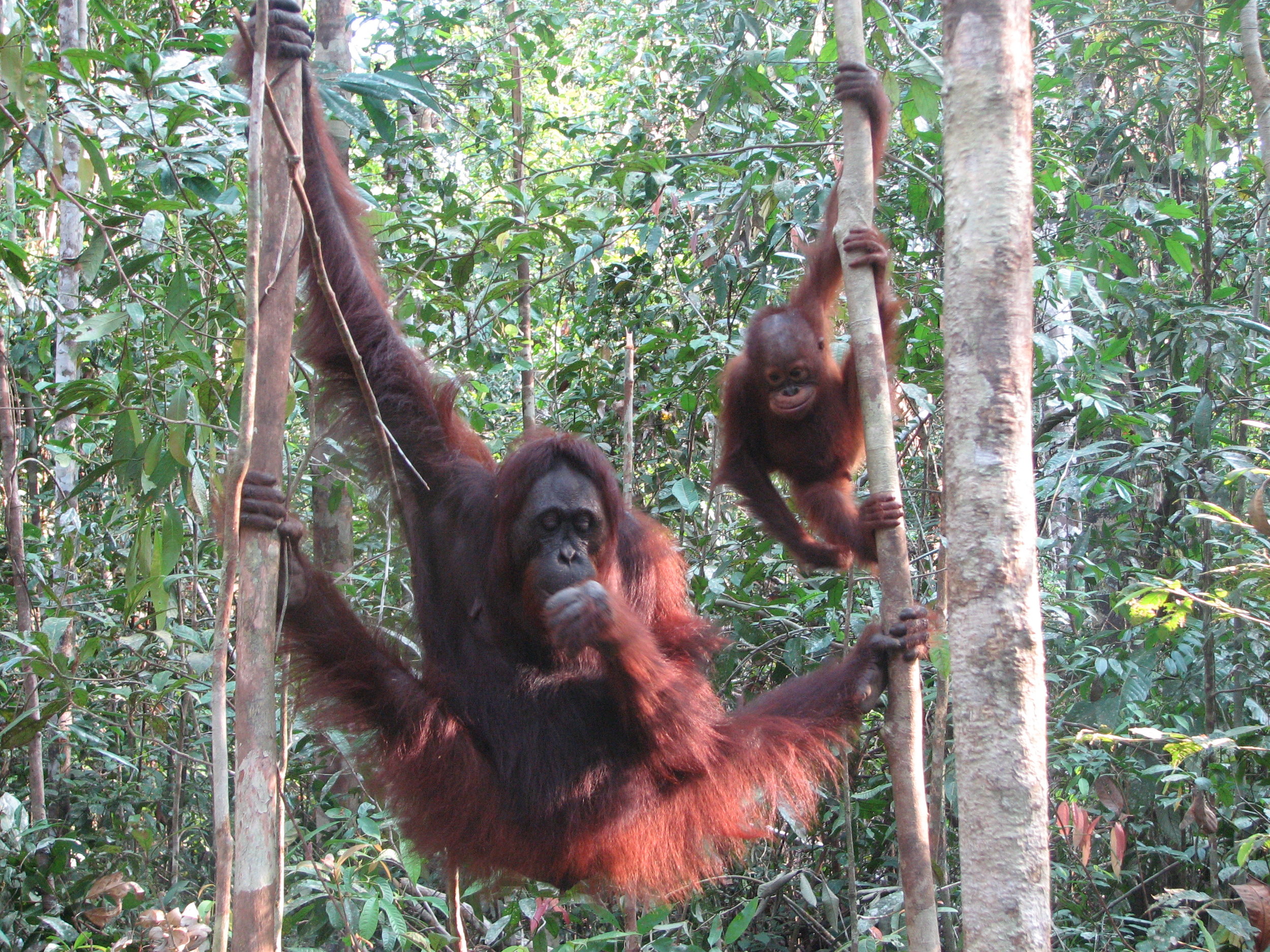
Thank you for your support. Click here to DOUBLE YOUR DONATION through the BIG GIVE.
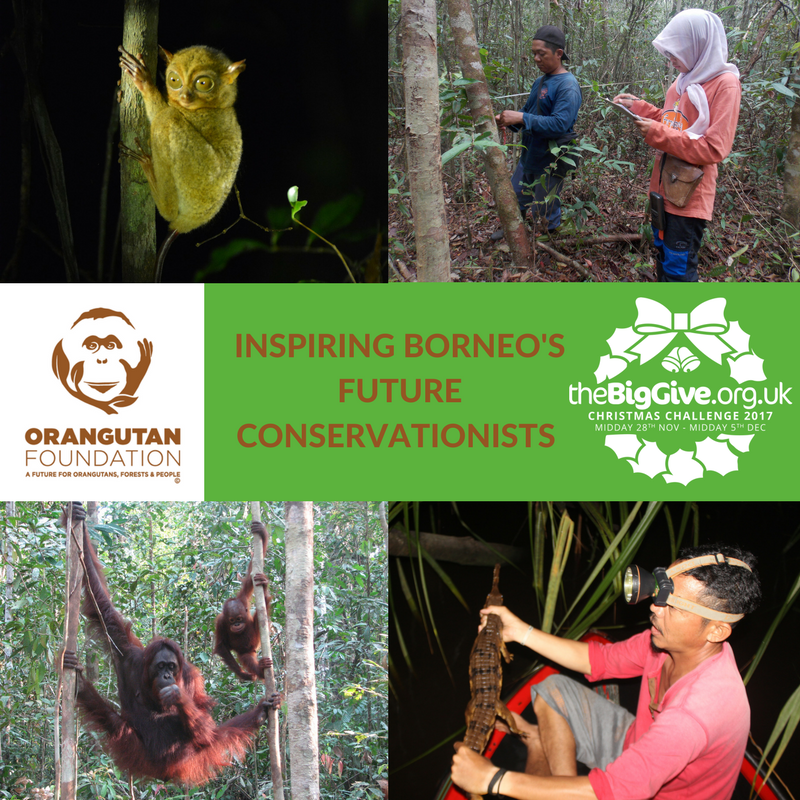
An interview with Jakir - Patrol Manager, Orangutan Foundation
To finish off Orangutan Awareness Week, our final blog post is about Jakir, who oversees the protection of the Lamandau Wildlife Reserve and its precious inhabitants. He has been in this role for 10 years. Jakir is also a talented photographer and many of his images have been included in our new photobook, The Orangutan's World. Our committed Indonesian staff are the bedrock of all we do. Please donate to support our vital work, keeping forests standing and orangutans in the wild.
Jakir, Patrol Manager Orangutan Foundation
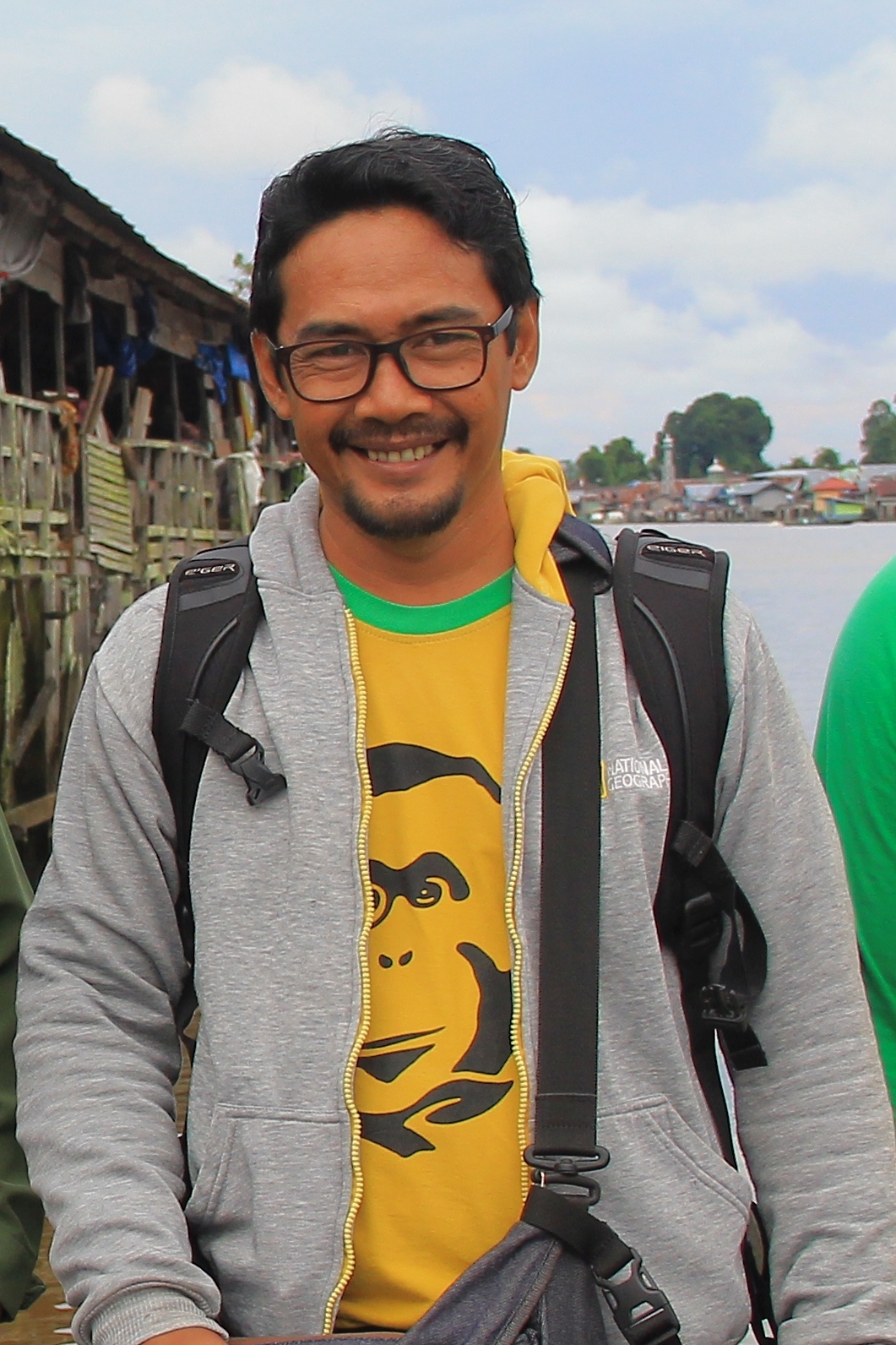
My role as Patrol Manager is to supervise the 12 staff who occupy our eight guard posts, ensuring that they are well maintained and operated, so that the wildlife reserves are protected from illegal activities, such as logging, mining, hunting and fishing.
It’s a very important role and I most of all I love the interaction with the local community in the field. Sometimes ignorance is the reason for illegal activities, and we tell people what we are doing so they also understand why we are protecting the forest.
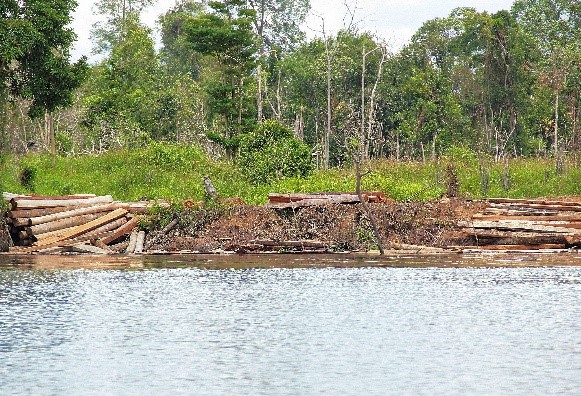
But the biggest challenge is facing people who deliberately do illegal activities. We have faced threats and bribes, but some people who were previously involved in illegal forestry now give us information on illegal activities they encounter.
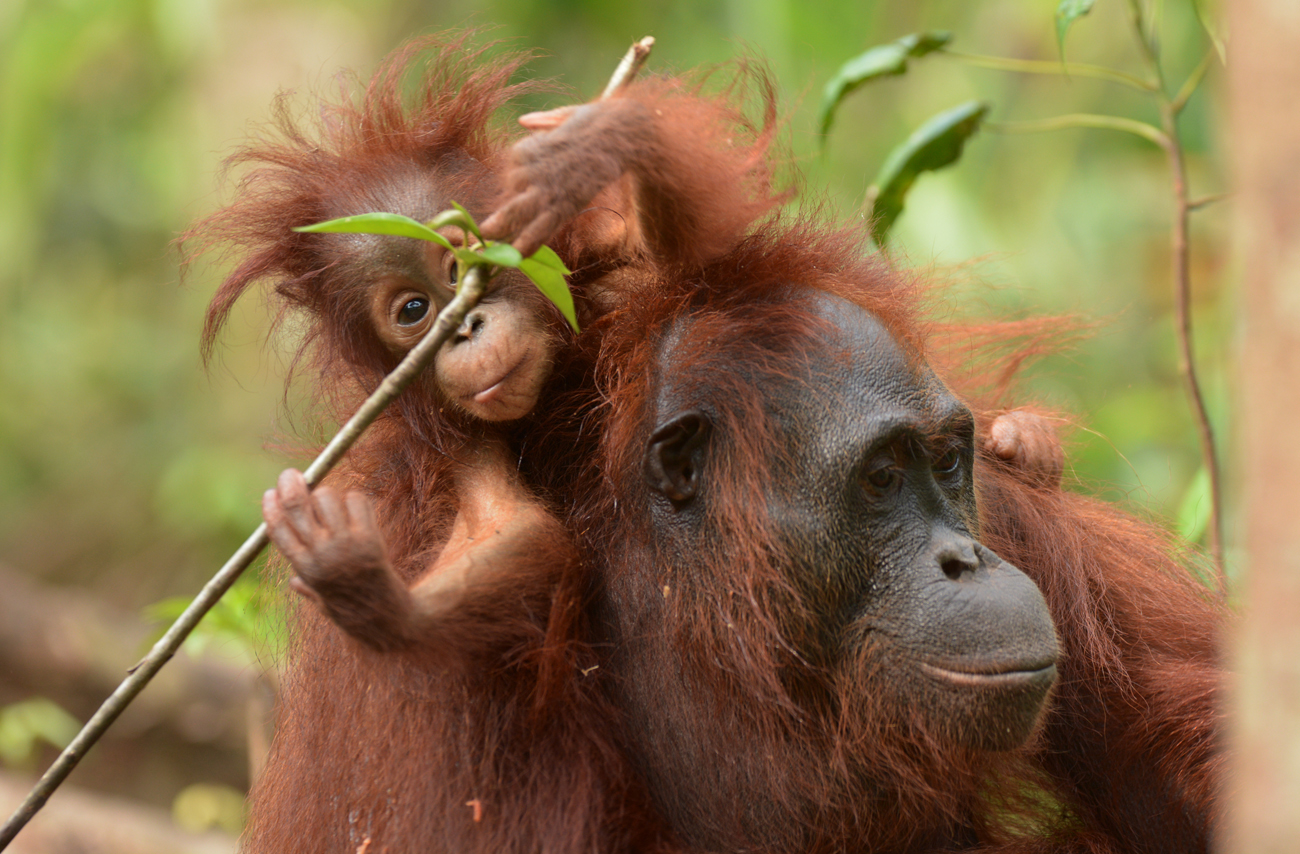
It’s very special to see some of the animals that we have saved roaming free in the forest in Lamandau.

When I first met Ashley, the Director of the Orangutan Foundation, I didn’t understand why she talked so much about protecting the forest and sacrificed so much of her own time for this. But a long time afterwards I saw some villages submerged by flooding and I realised why protecting the forest is so important.
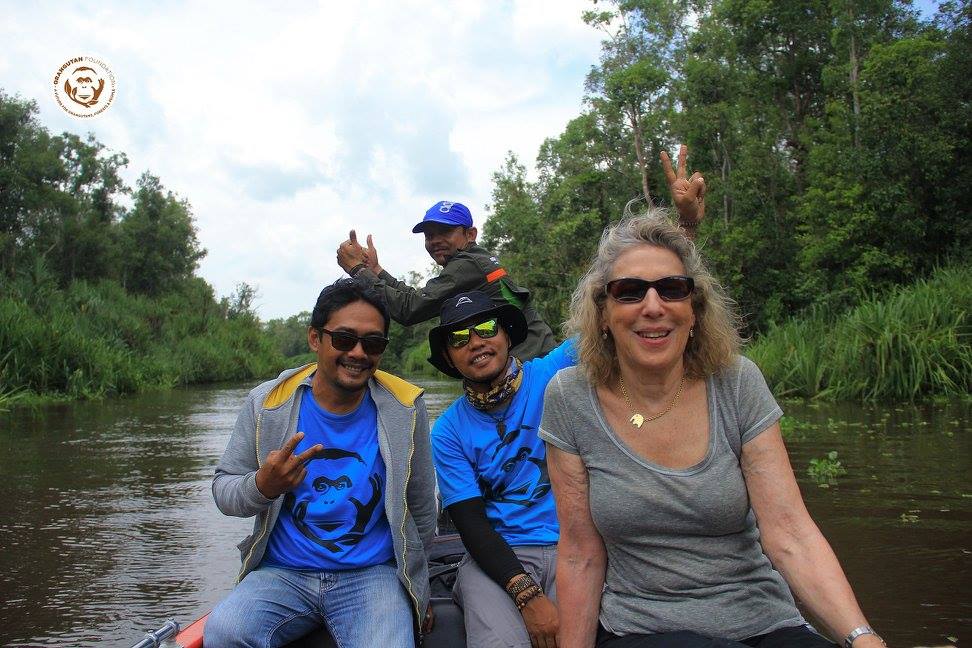
My hope is that the forest will always be alive and awake, so that my grandchildren can see and feel the coolness of this forest.
Written by Anna Levin, this interview was featured in our latest member's newsletter, Red Ape, Autumn 2017.
By donating £16.50 a month you can become a Guardian of the Lamandau Wildlife Reserve and support the protection of over 150,000 acres of tropical forest habitat. Click here to find out more.
Meet Aan the orangutan
To celebrate Orangutan Awareness Week, we are telling the stories of some of the orangutans who have been given a second chance thanks to your support for our work, but unfortunately, not all have a second chance in the wild. Aan
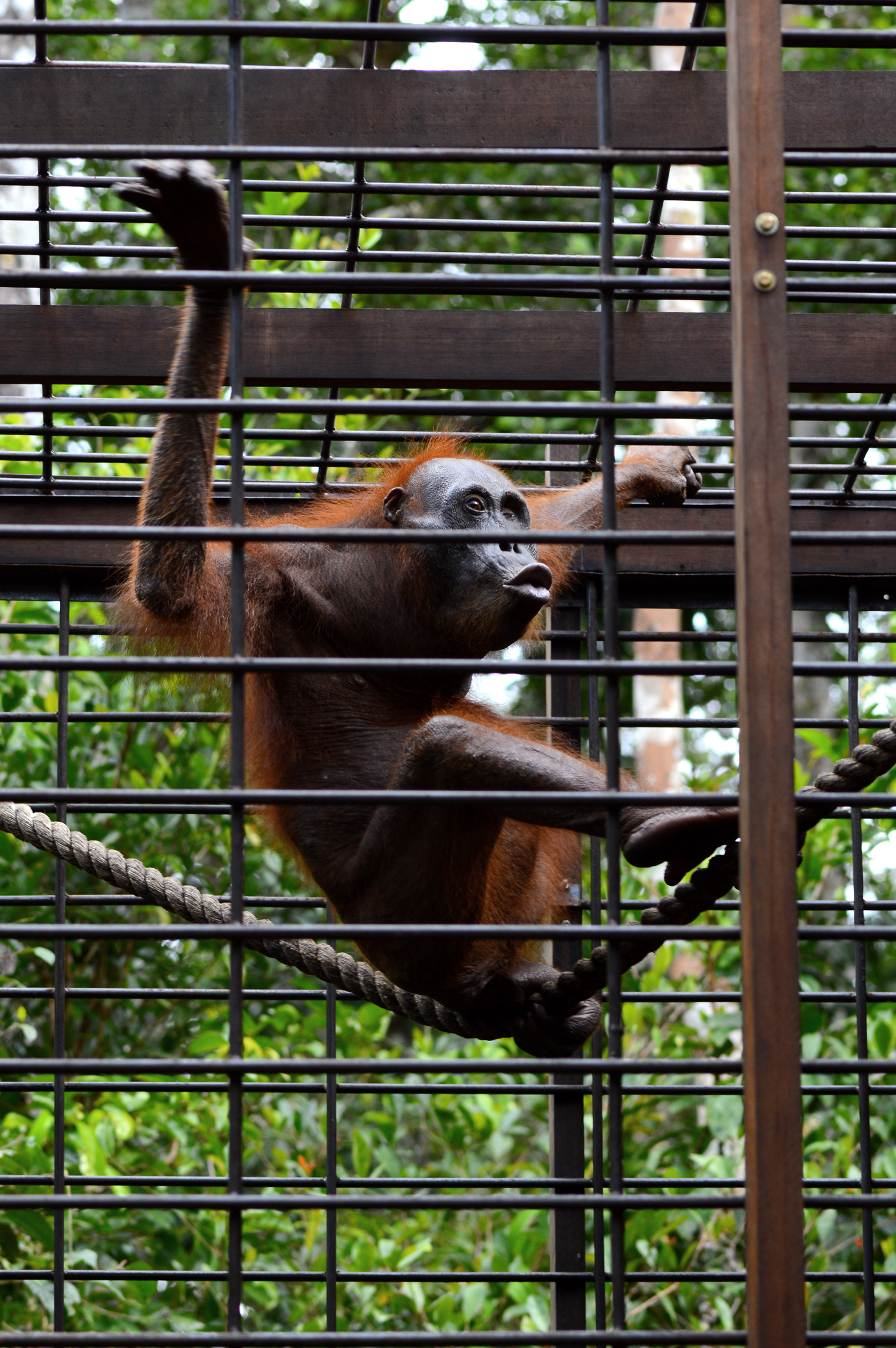
Aan is a blind orangutan. She first came to us in 2012, having been found stranded on an oil-palm plantation, after being shot over 100 times with an air gun. The injuries sustained left Aan blind. You can read more about her rescue here.
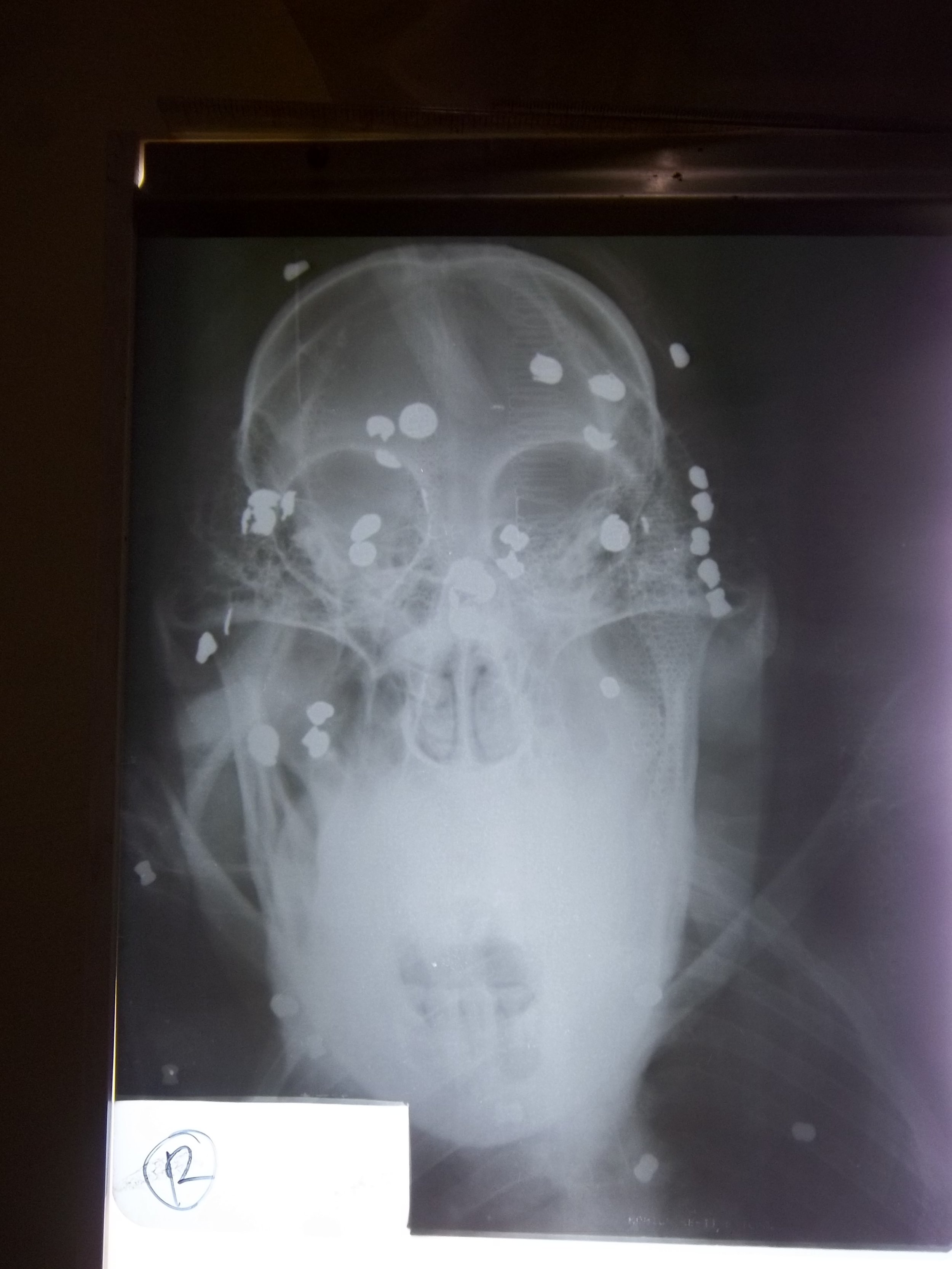
In 2016, we arranged for an ophthalmic surgeon to visit Aan to see if there was any chance of restoring her sight, with the hope that one day she could return to the wild. Aan underwent surgery but it soon became clear that the damage sustained was too severe and Aan would be permanantly blind.
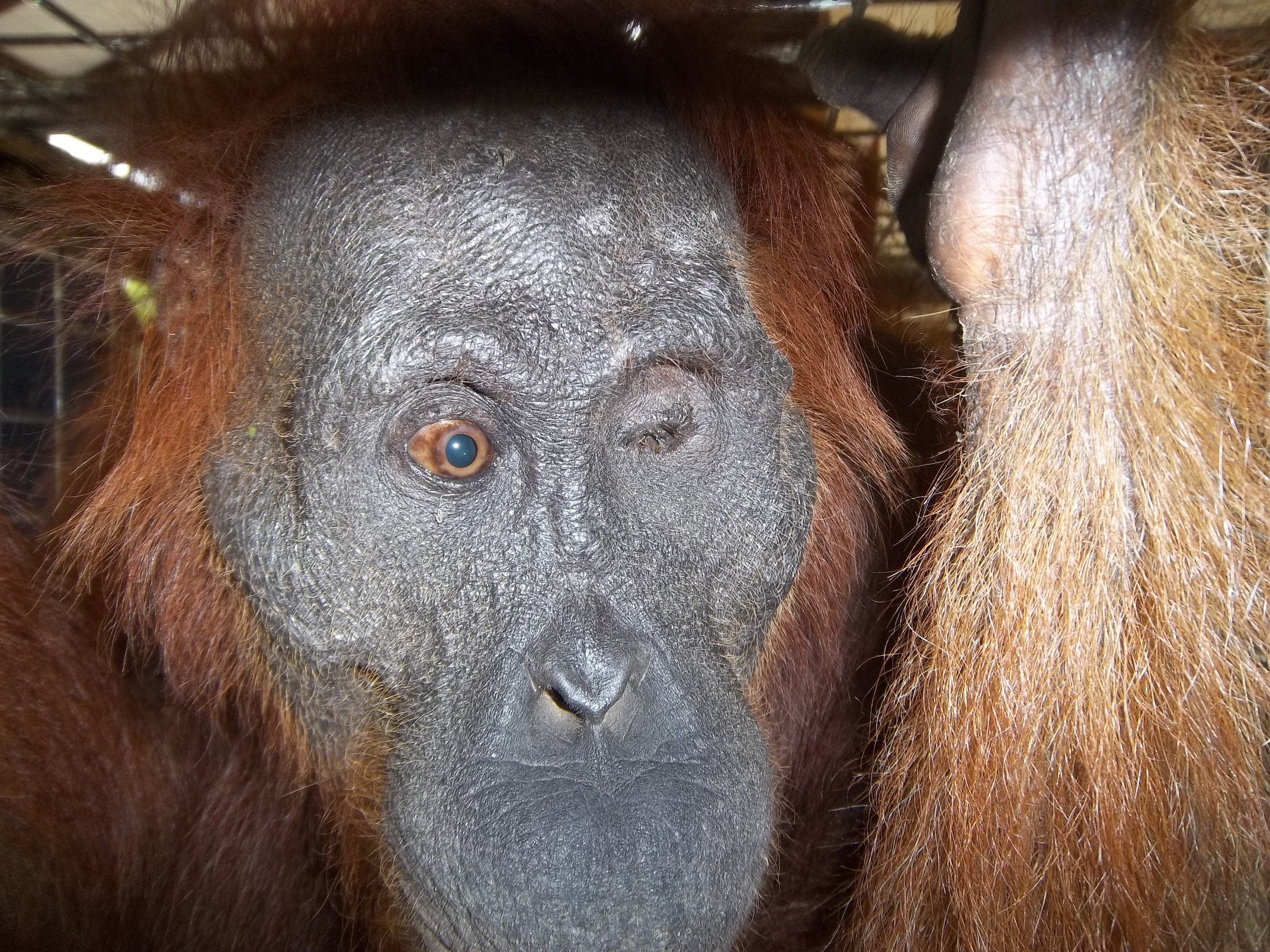
Aan lives in a purpose-built enclosure at Camp Gemini, where our vet clinic is located, in the Lamandau Wildlife Reserve. Our staff give her the best quality of life that is possible, but sadly Aan can never return to the forest, where she belongs.
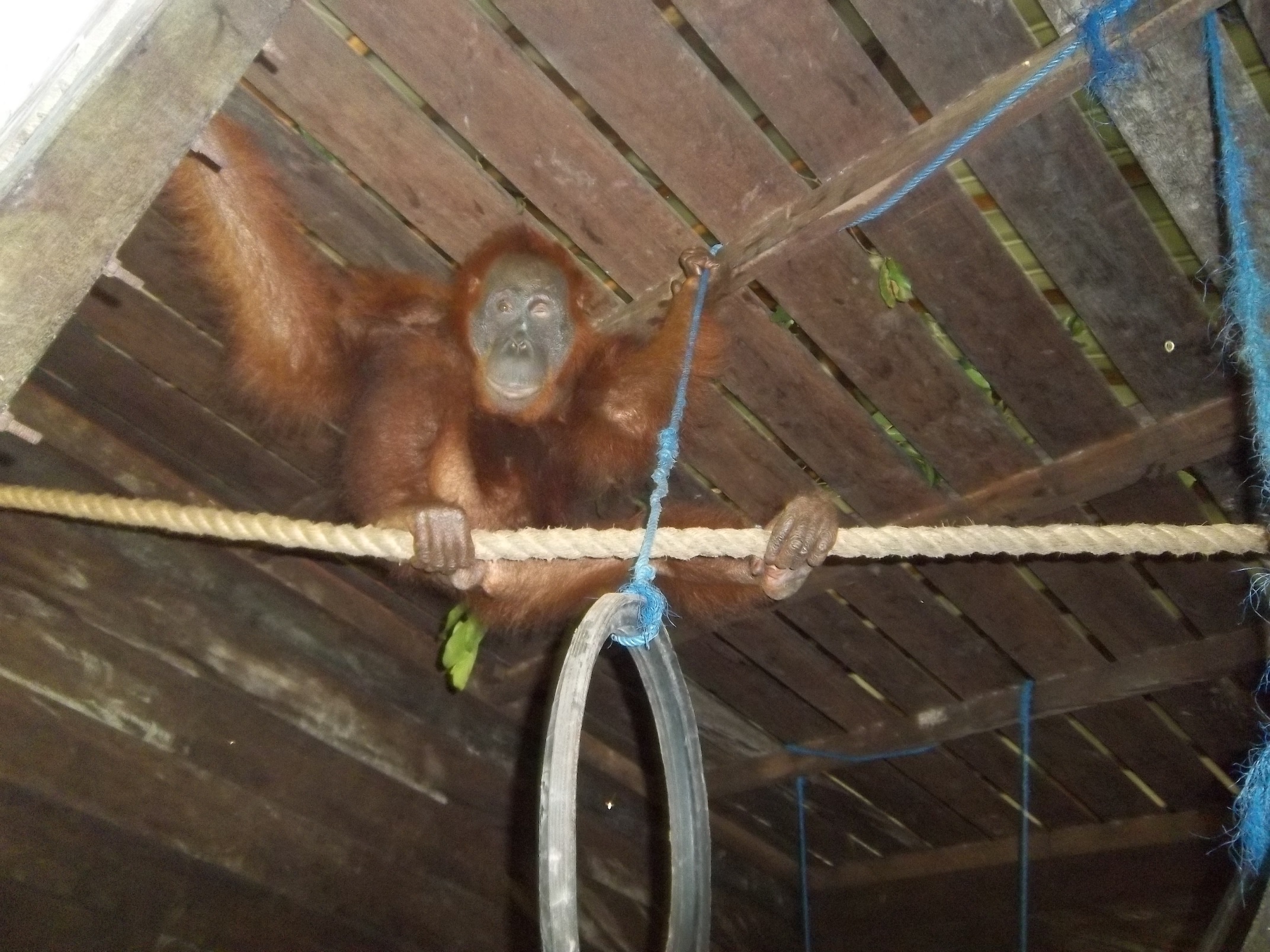
Aan’s story serves as a heartbreaking reminder that the threat to orangutans caused by habitat loss is a very real one. Please support our care of Aan during Orangutan Awareness Week by donating here.
Meet Kotim the orangutan
It is Orangutan Awareness Week and each day we will bring you a story about the orangutans in the Lamandau Wildlife Reserve. Thanks to your support we are protecting their forest home the Lamandau Wildlife Reserve and keeping them wild and free. Kotim
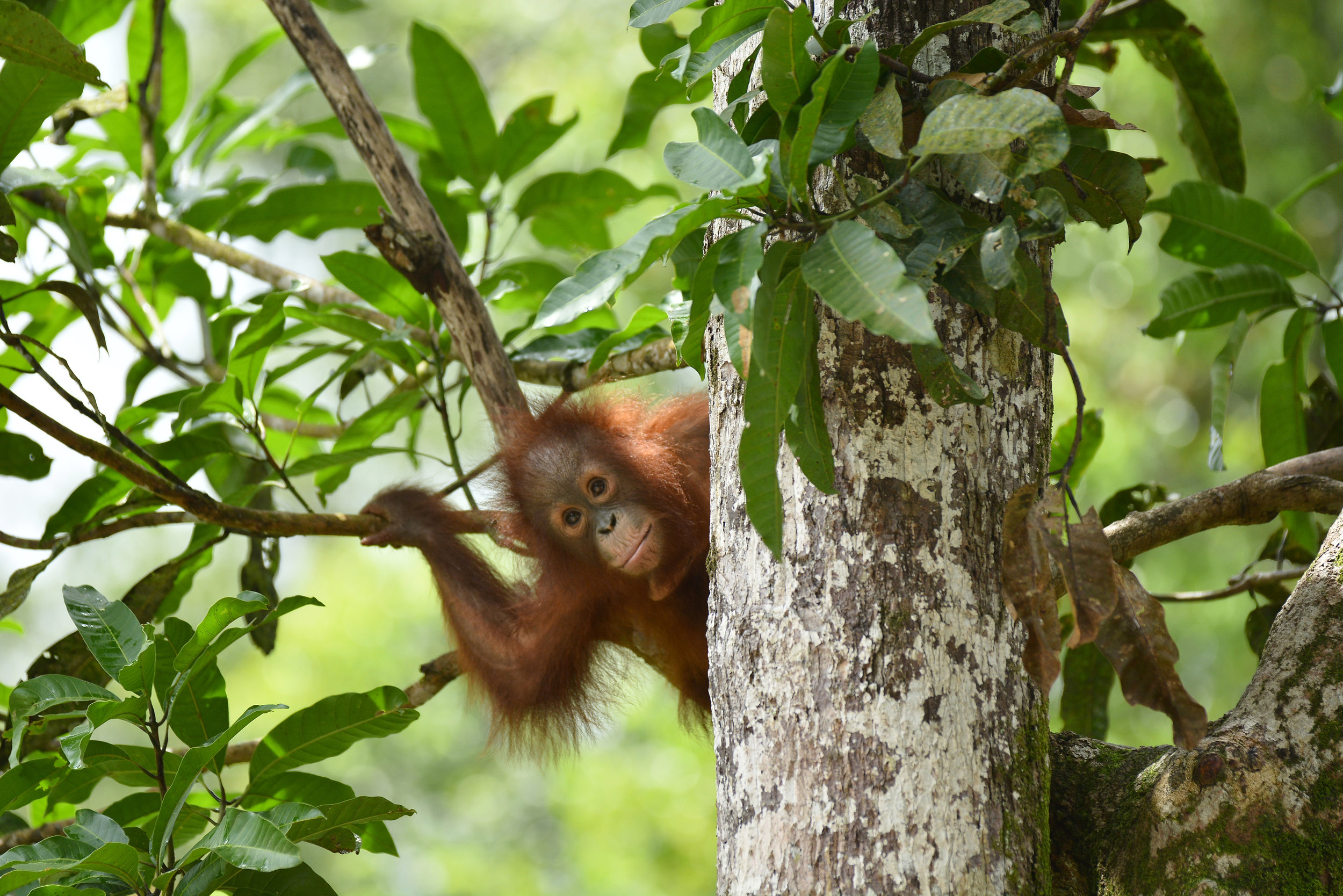
Kotim was rescued in 2014. She was handed over to Orangutan Foundation after being illegally kept as pet. Sadly, we can only assume that her mother was killed.
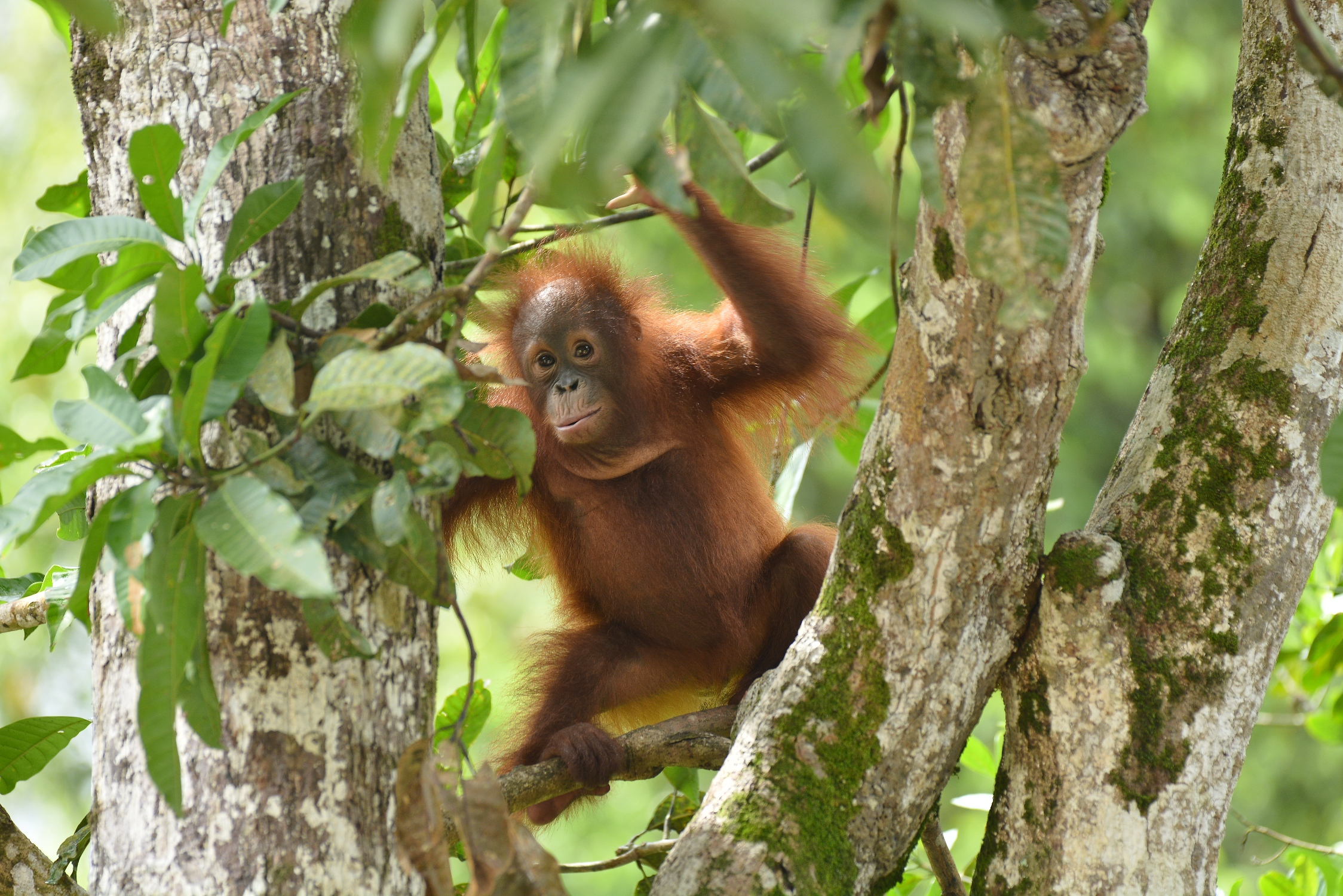
At three-years-old Kotim was too young to be released back into the wild and so entered into the care of our Soft-Release Programme, at Camp Rasak in the Lamandau Wildlife Reserve, Indonesian Borneo. Kotim joined another infant orphan, Torup. They became playmates and together practised their nest-building and climbing skills.
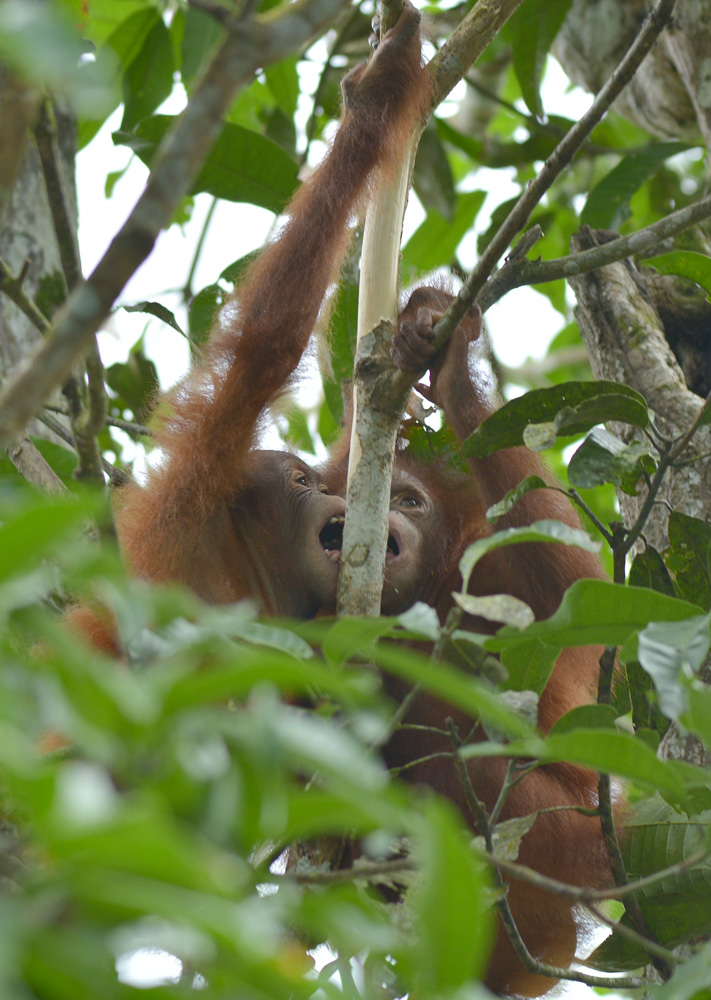
By April 2016, Kotim was deemed to have all the skills needed to survive in the forest and was successfully released. She is still occasionally seen by Orangutan Foundation staff. In December 2016, Kotim was seen with adult female orangutan Acuy and her infant, Ariel.
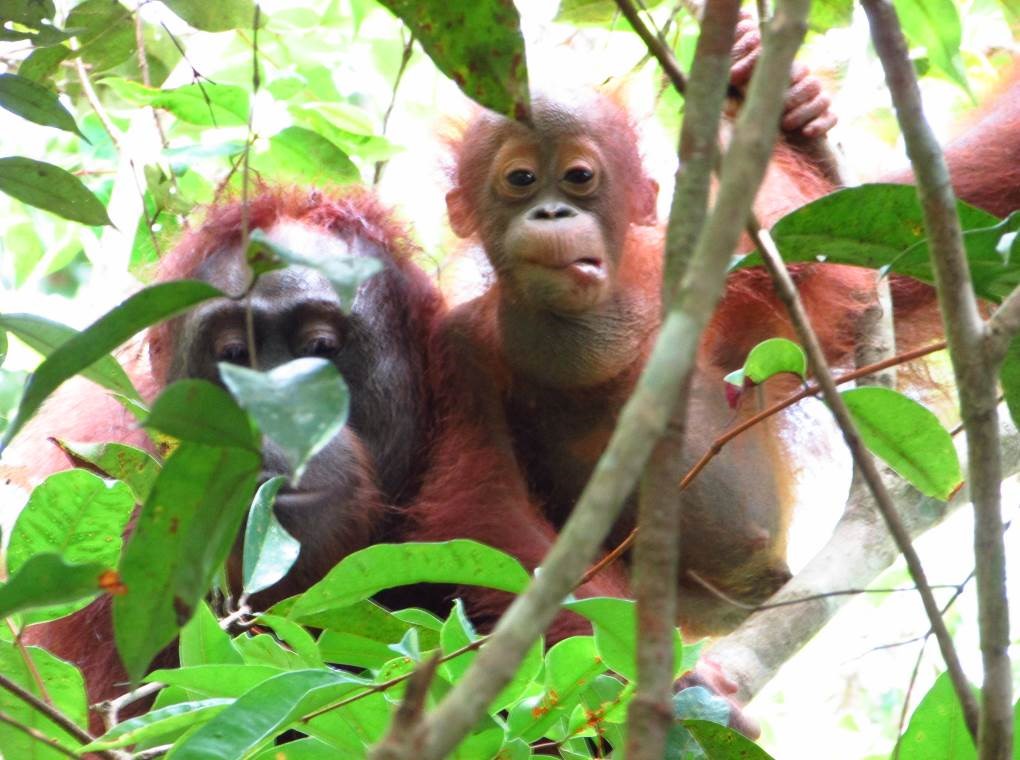
Support Kotim during Orangutan Awareness Week. Please donate to help us protect her tropical forest home. Keep forests standing and orangutans in the wild.
Please donate here.
Here's a video of Kotim whilst under our care in our Soft-Release Programme:
Meet Bangkal the orangutan
To celebrate Orangutan Awareness Week, we are telling the stories of some of the orangutans who have been given a second chance thanks to your support for our work. Bangkal
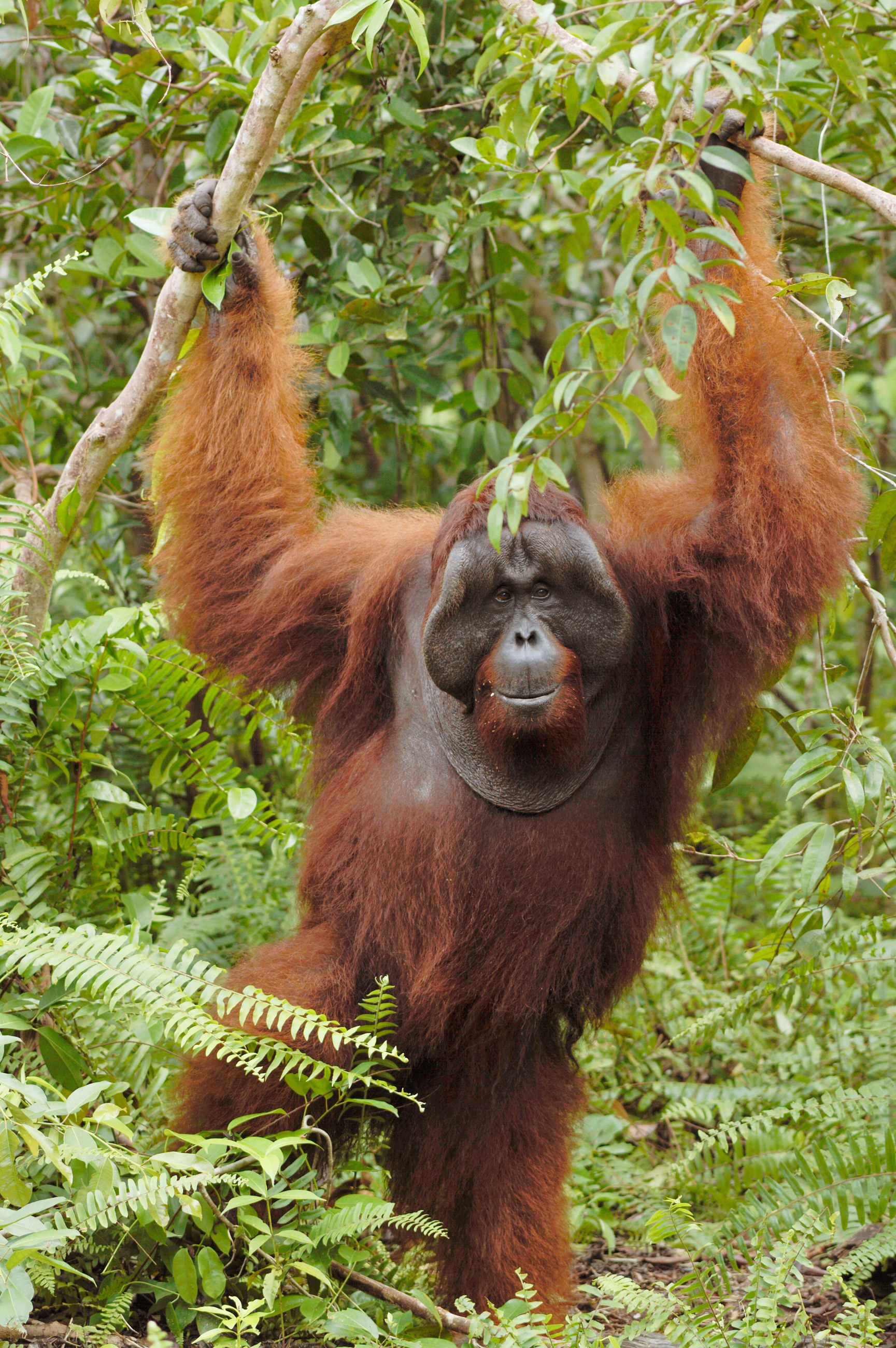
In the late 1980’s Bangkal was an orphaned infant, being kept as a pet. He was rescued, rehabilitated over many years, and then released into Tanjung Puting National Park, Central Kalimantan Indonesian Borneo.
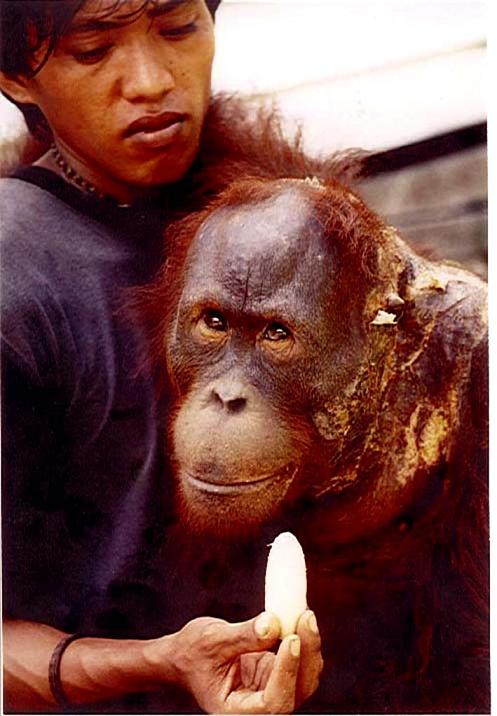
In 2000, when illegal logging was rife in Indonesia’s National Parks, Bangkal became the victim of a horrifying incident. Illegal loggers threw hot oil over him resulting in a burn down his face and neck.
During his recovery, Bangkal protected himself from annoying insects, by using a blanket to cover his injured face. Once recovered, Bangkal was released again but this time into the Lamandau Wildlife Reserve.
Now aged around 28 years-old, cheek-padded Bangkal is magnificent. He is the dominant male around Camp Gemini and is thought to have fathered many offspring.
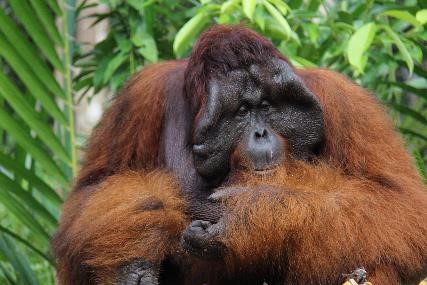
Support Bangkal during Orangutan Awareness Week! Please donate here to help us protect Bangkal in his forest home.
Meet Holahonolulu the orangutan
To celebrate Orangutan Awareness Week, we are telling the stories of some of the orangutans who have been given a second chance thanks to your support for our work. Holahonolulu
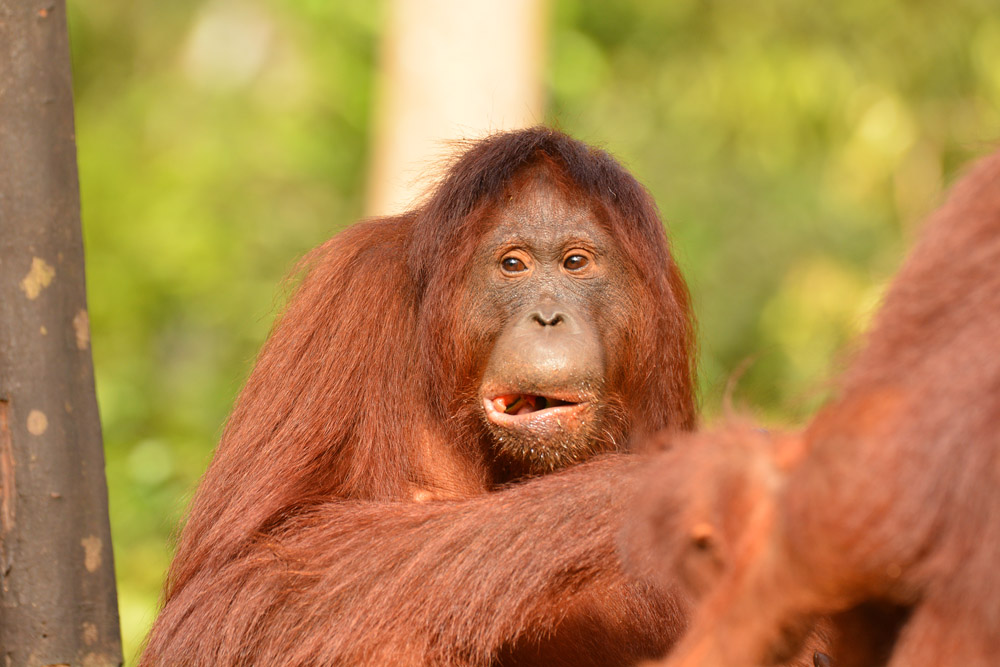
Holahonolulu is a wild born adult female orangutan. Her mother, Huber, was released into the Lamandau Wildlife Reserve in around 2000 and Holahonolulu was born in 2004. Huber unfortunately passed away in 2012.
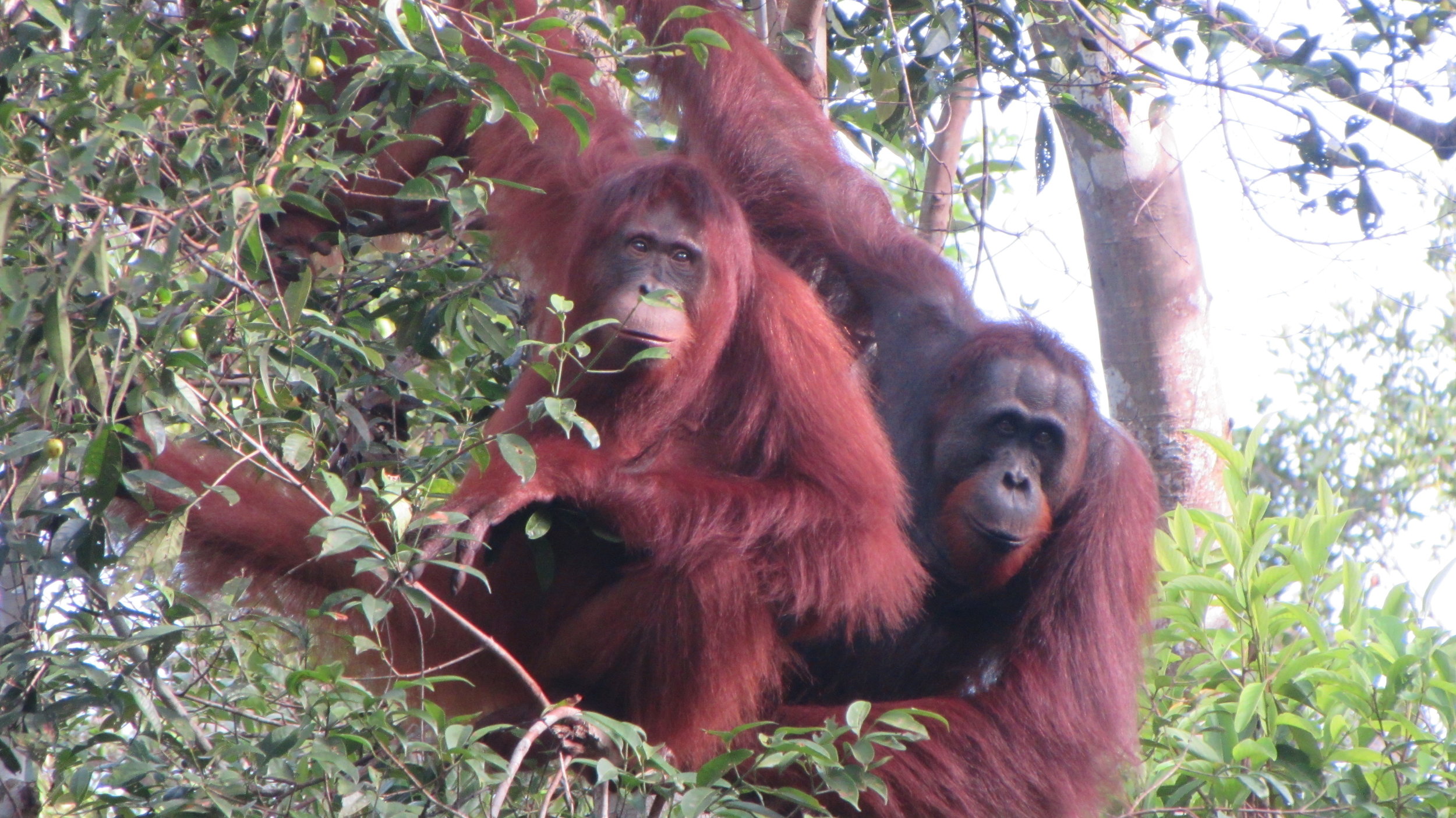
Holahonolulu is often seen by Orangutan Foundation staff at the feeding station, close to Camp Gemini. She been observed with Bangkal, a dominant male, mating on several occasions. Orangutans have a gestation period of about 9 months, it is slightly shorter than humans. Watch this space for the announcement of a new arrival in a few months’ time!
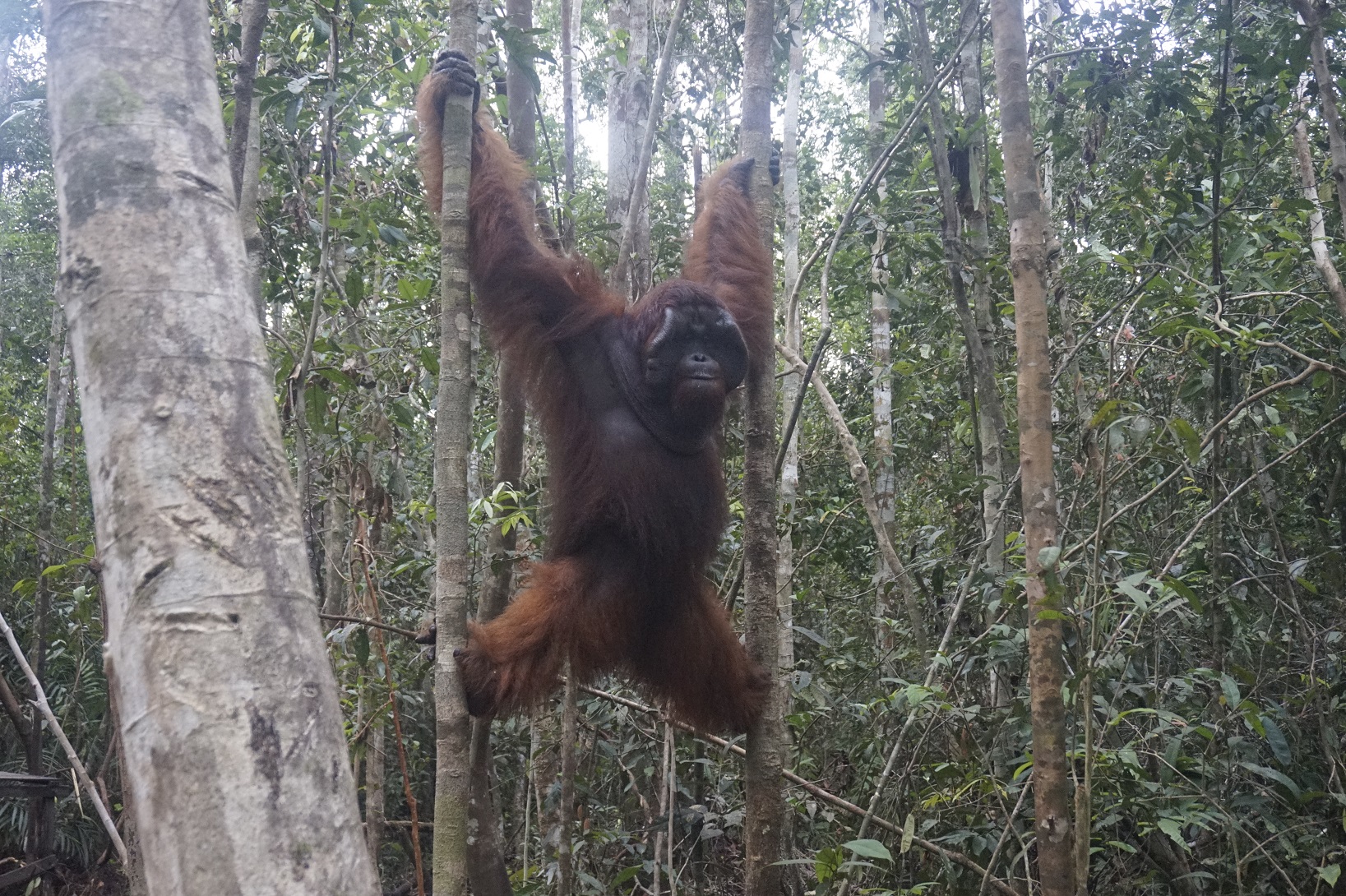
We are delighted when released orangutans go on to produce future generations. The orangutans of Lamandau Wildlife Reserve are now a healthy, viable and growing population.
Support Holahonolulu during Orangutan Awareness Week here! Please donate to help us protect her tropical forest home.
Freedom in the wild
If you want something done, ask a busy person. This expression is especially true for Orangutan Foundation Director, Ashley Leiman OBE, who has just returned from a field visit to our programmes in Central Kalimantan, Indonesian Borneo. One of the highlights was a tree planting ceremony to celebrate the planting out of over 22,000 seedlings in degraded forest habitat in the Lamandau Wildlife Reserve. The most memorable day though involved the return to the wild of seven different species. Captured from the wild and kept as pets, these animals had been confiscated by the Wildlife Department of Central Kalimantan (BKSDA Kalteng). The day was also a chance for Ashley to meet Bapak Adib Gunawan, the new Head of Wildlife for Central Kalimantan, who was overseeing the releases.
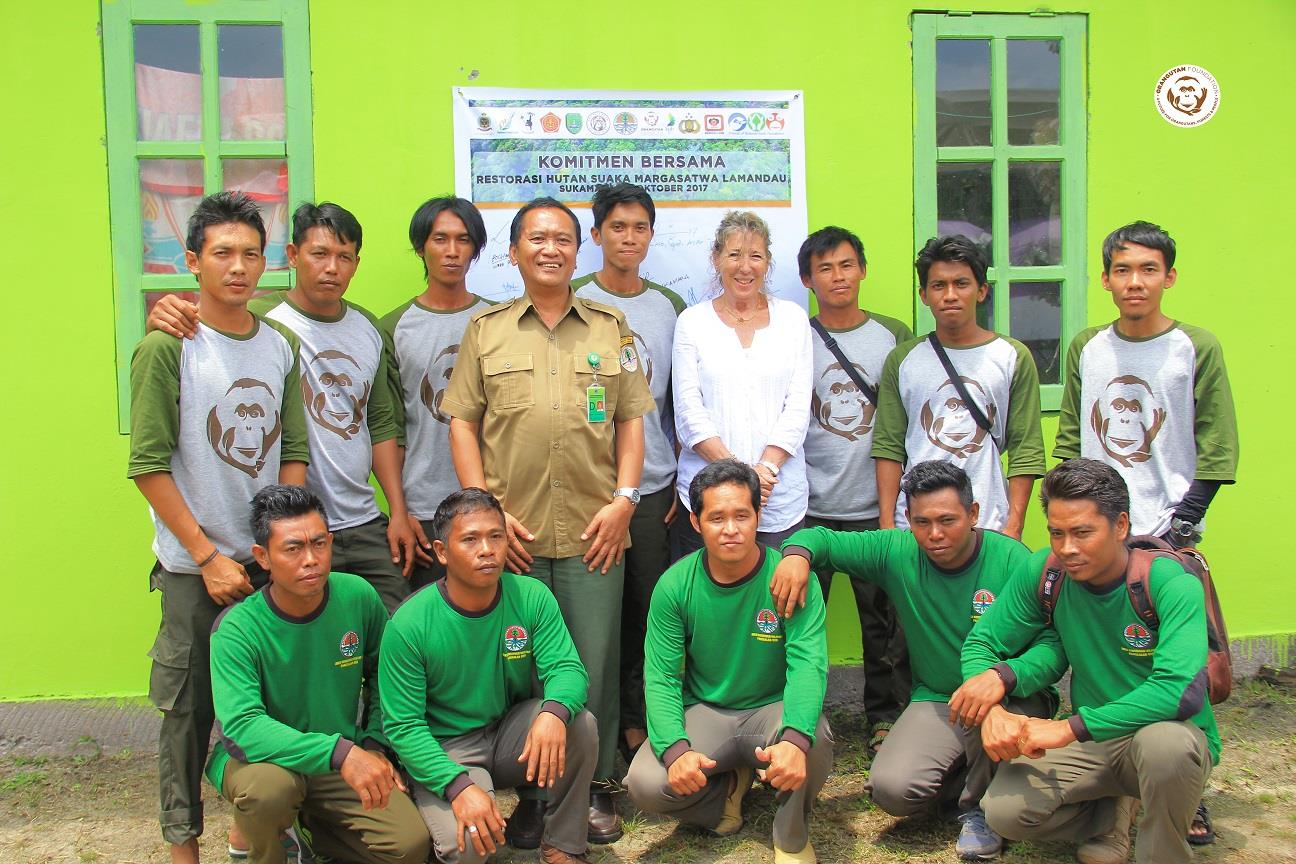
The animals due for release included two changeable hawk eagles, a hornbill, a pangolin, a slow loris, two reticulated pythons, a sun bear and a young orangutan.
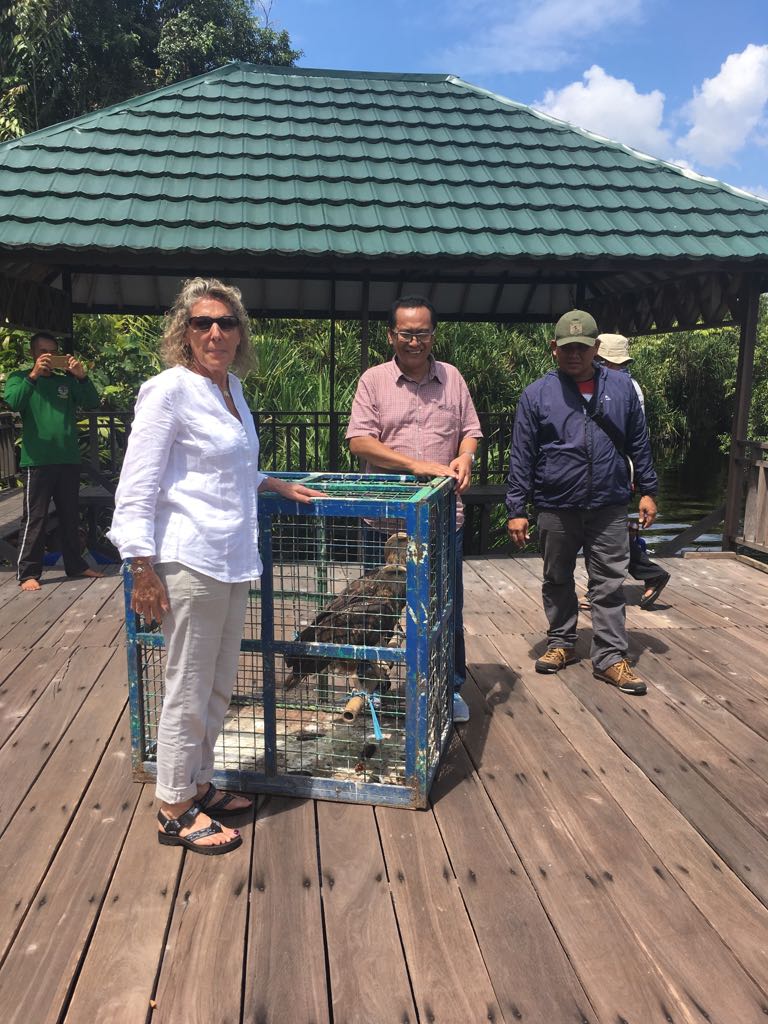
The orangutan, a handsome young male of around one-and-a-half years old, had been kept as a pet in a nearby town. He was named Adib, after the new Head of Wildlife, and has joined our Soft-Release Programme at Camp JL, in the Lamandau Wildlife Reserve, where he’ll learn the skills to survive in the forests.
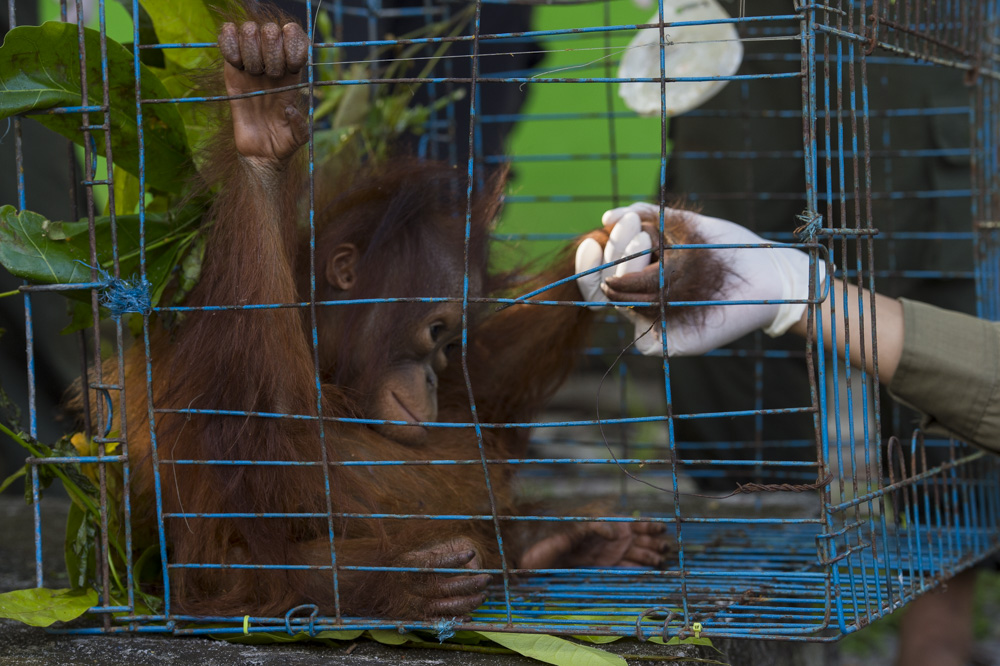

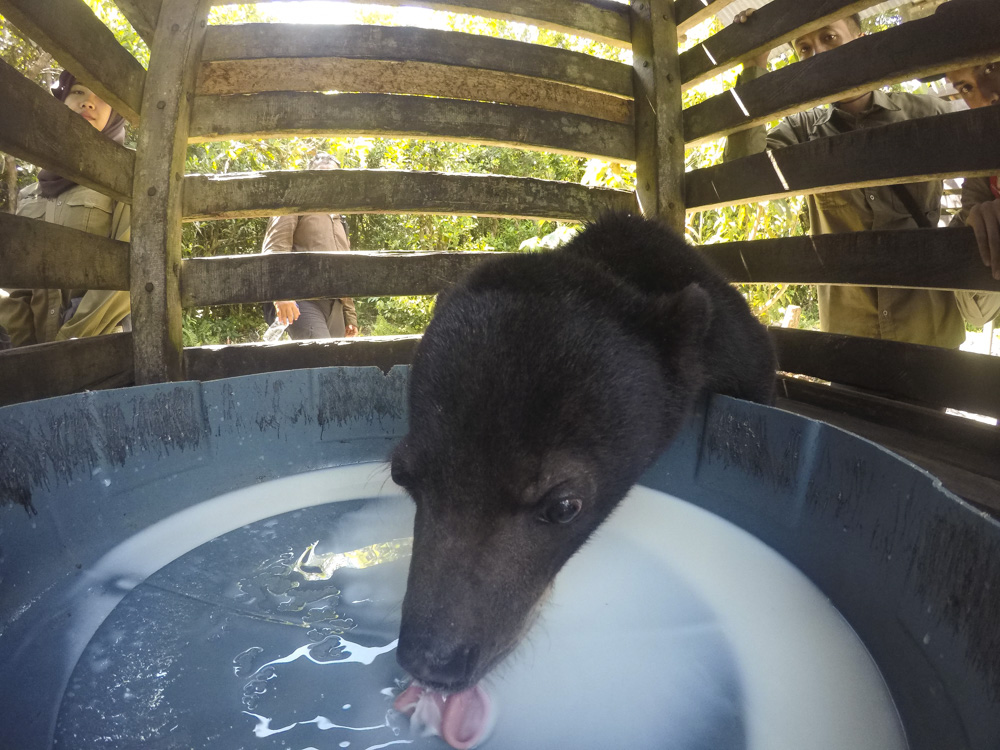
A playful sun bear, named Paddington (also a pet), was taken to Camp Siswoyo, where Orangutan Foundation staff will care for him until he is old enough to live independently. The slow loris, being a nocturnal primate, was released after nightfall.
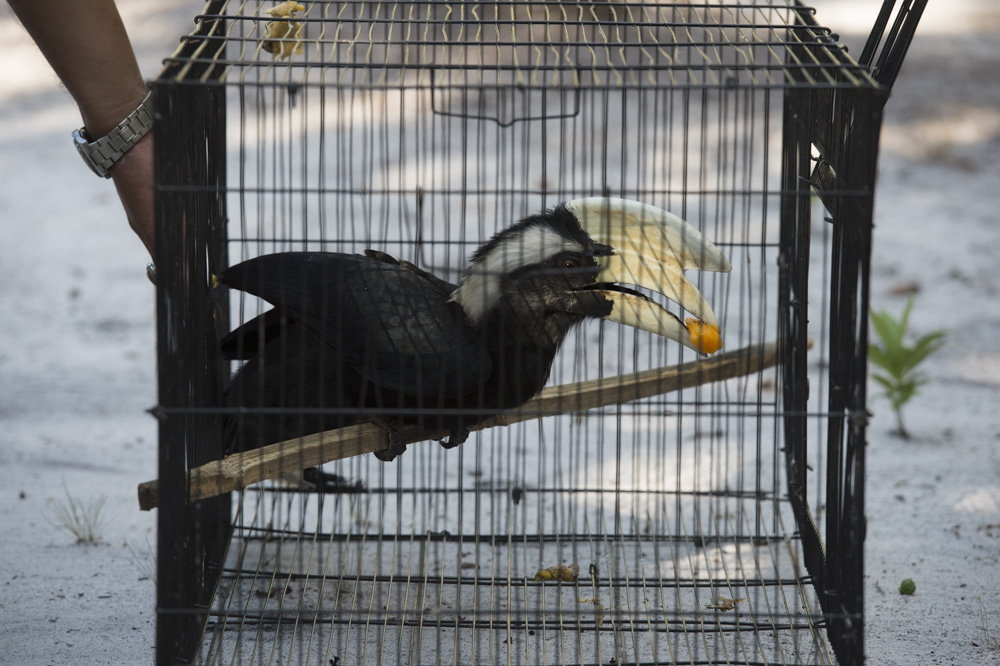
The changeable hawk eagles and hornbill were released from a guard post in the reserve, and Ashley opened the slide door to the crate of the pythons.
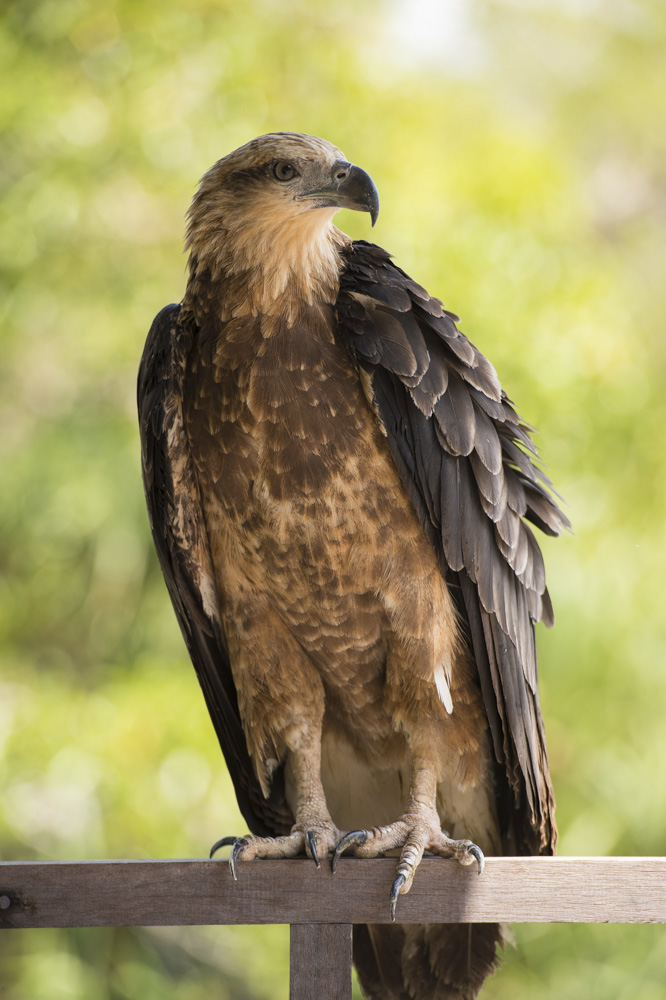

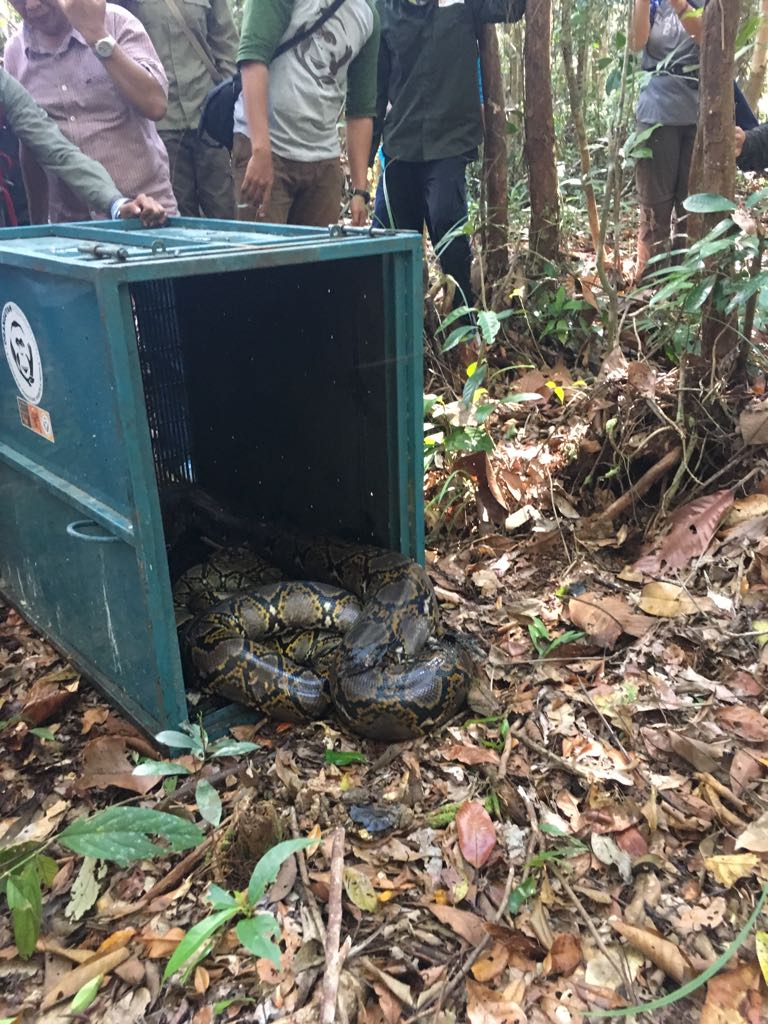
Over 3 meters in length, Ashley questioned why anyone would want to keep the snakes as a pet! We’ll post a separate blog on the pangolin, so watch this space.
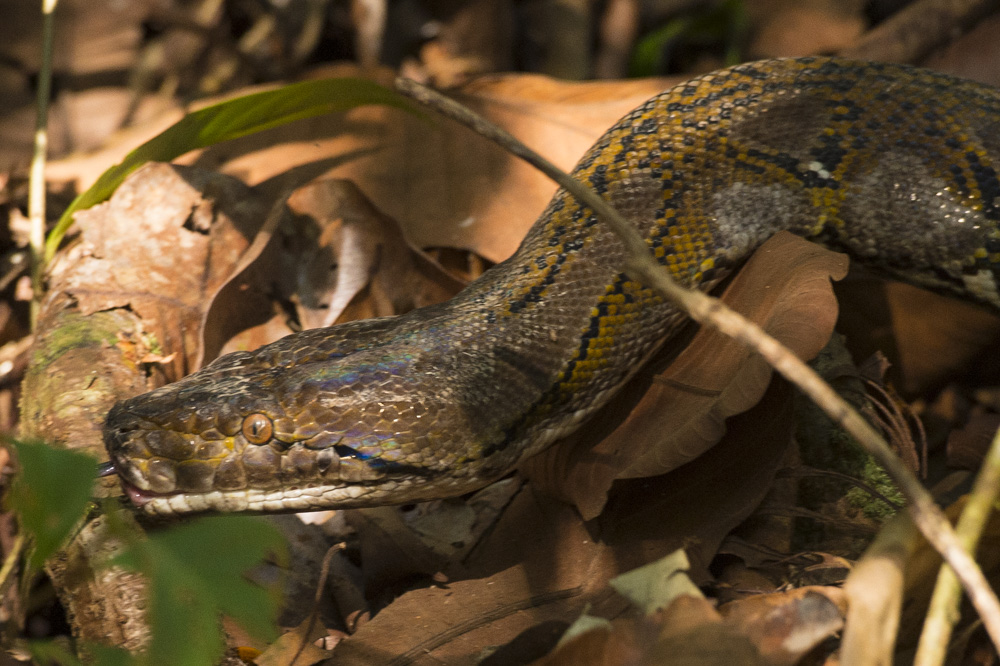
Ashley pointed out that our work for these animals has only just begun. Through our habitat protection work we must ensure that the forests stay standing, so the wildlife stays in the wild.
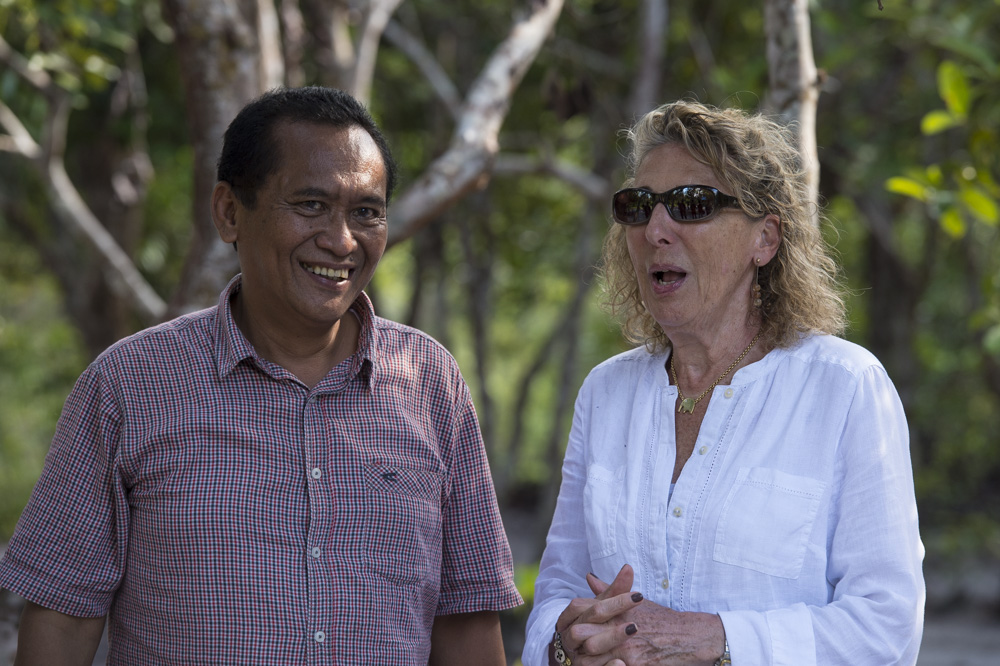
Please support our work, donate now.
Thank you.





